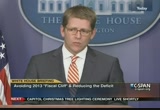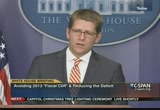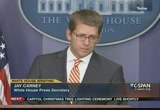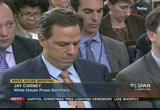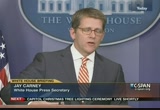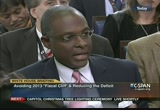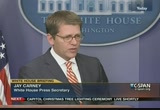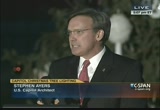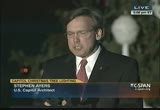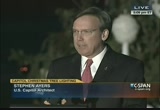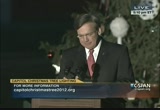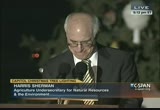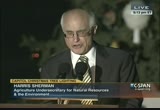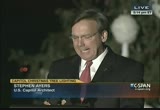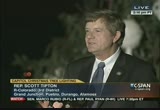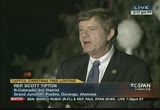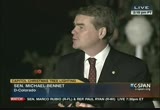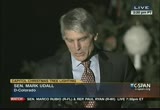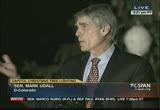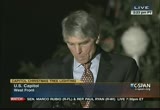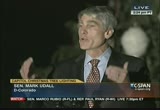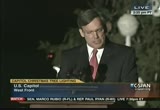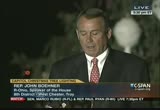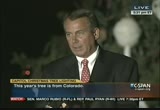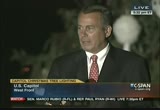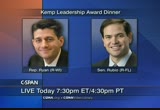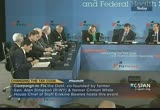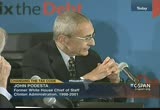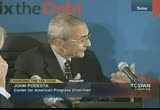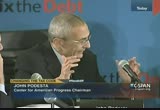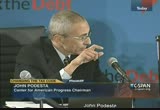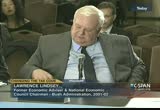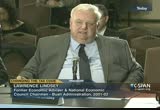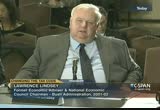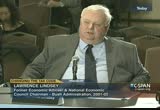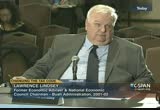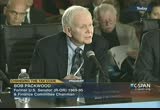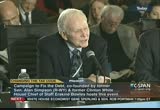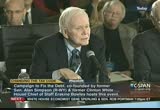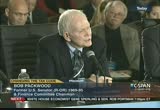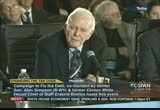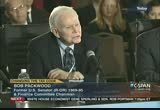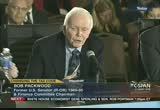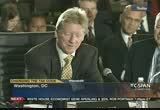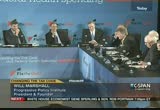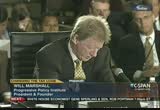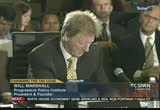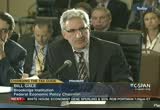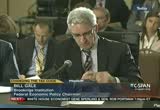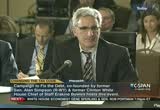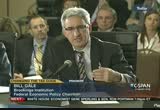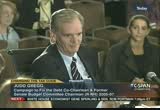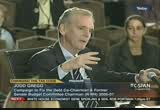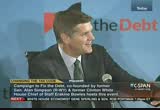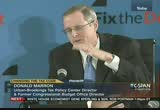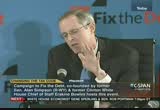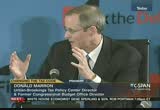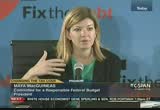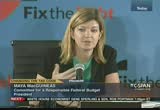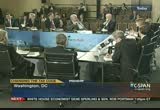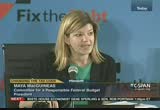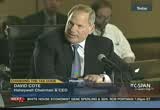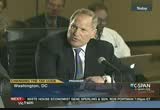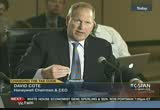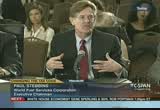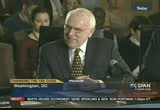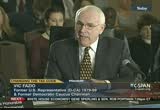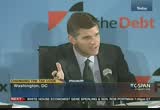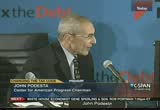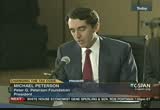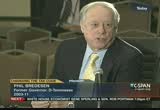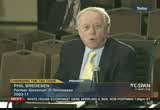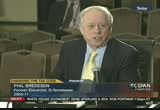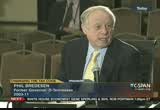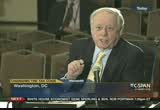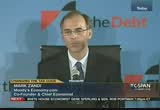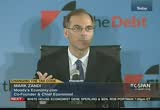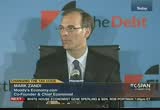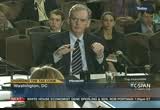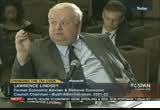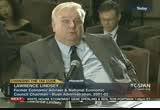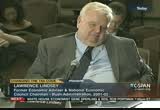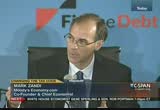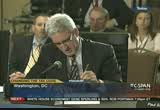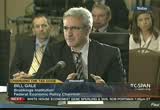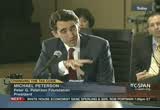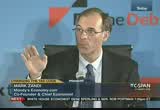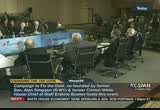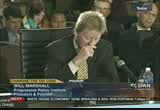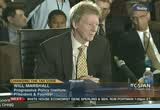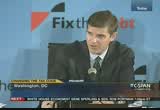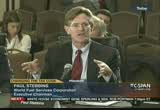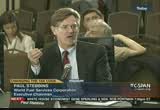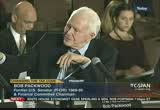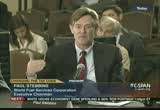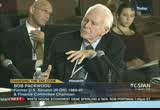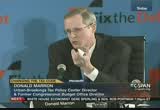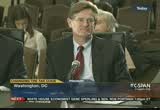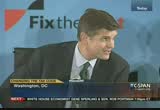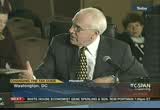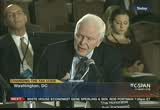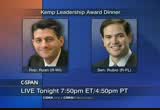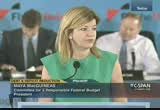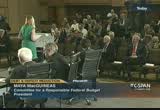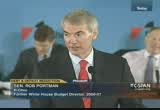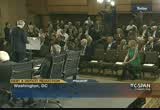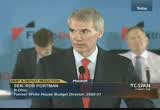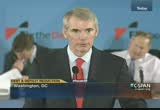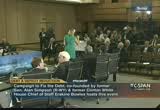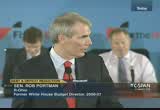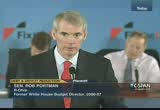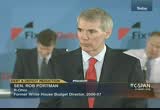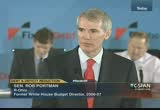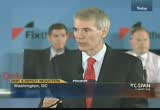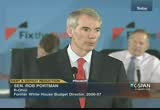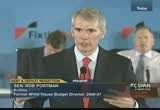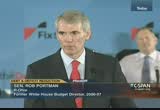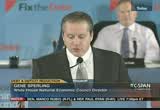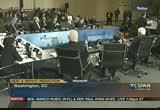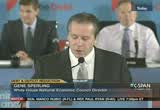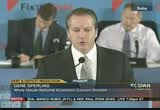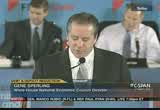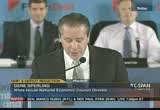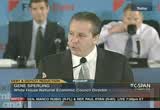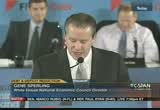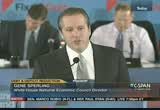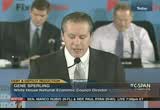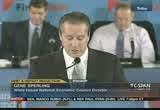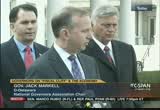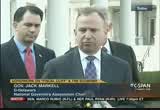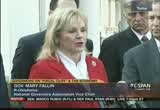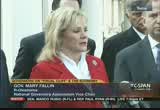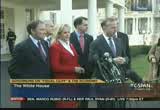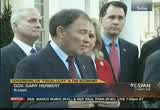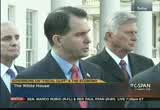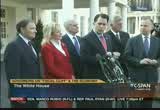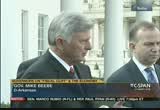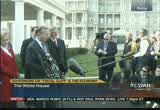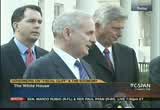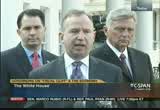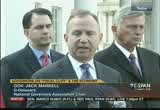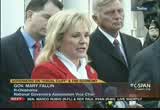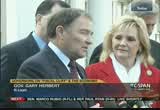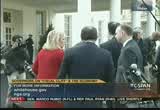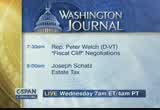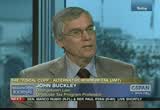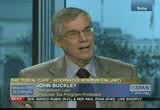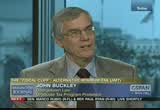tv Public Affairs CSPAN December 4, 2012 5:00pm-8:00pm EST
5:00 pm
balanced deficit reduction package that will do enormous good to our economy. and the kind of package that i should not leave out, that includes targeted investments so our economy continues to grow and create jobs. it would, as i said on a number of occasions, deficit reduction in an of itself is not a goal, it should be part of an economic plan is that is focused on economic growth and job creation. the president is very focus odden that. >> just a second ago, you referred to, when talking about the debt ceiling, taking it off the table, to be part of the deal. you referred to the economy being held hostage. you're aware that president obama voted against -- >> we addressed that. there was no threat of default at the time. what happened in 2011, as we all know because we all lived it, most of us in this room, was the threat of default, a willingness expressed by many
5:01 pm
to see the american economy under default and with all the consequent impacts on the global economy and on the american middle class. . in order to do that and was enormously damaging to consumer confidence. we were downgraded famously and it is a testament to the american people and the american economy and the american business and some of the success we have had working with the congress that we have been able to rebound and the economy continues to grow and create jobs but that was a self-inflicted wound and we can't have that nonsense anymore. >> ok for people to engage in that kind of nonsense --
5:02 pm
>> i appreciate the question and i refer you to my comments back then. >> people voting the way obama did. >> what happened in 2011, republicans in congress demanded and said they would let america default if they did not get the items on their agenda. that was consequential and unprecedented and the result was bad for everyone. >> two weeks ago, the committee for responsible federal budget, which includes democrats and republicans, including tyson and others, they put out a paper on raising revenue on high earners. they say that there is a middle ground in which democrats will raise higher revenues. you just don't agree with their
5:03 pm
numbers? >> independent economists have assessed that. when you talk about wiping out the charitable deduction or the mortgage deduction in a way that taxes and middle-class americans that violates the fundamental preliminary that the president has -- in order to preserve low tax rates for wealthy americans, to ask the middle class to pay the price is not going to happen. it's not just the policy. >> only taxes on those families making $250,000. >> every proposal that has been seen and analyzed imagine you can achieve the necessary amount of revenue by closing deductions or closing loopholes, does that in one of two ways. one, raising taxes on the middle class by eliminating very
5:04 pm
family-friendly deductions like the mortgage deduction, health care deduction and others or by taking draconian action on the charitable deductions and others that aren't good policy or aren't realistic. it would be hard to explain, i don't think members would want to explain to nonprofit hospitals, major charities, universities and others that all that -- all those contributions that they received in the past will not be forth coming because of an action of congress, i don't think that is realistic. >> one last question, if the amount of revenue were the same as raising rates, does it matter -- as long as the revenue is being raised from wealthier americans with the stipulation that there is one deduction you don't want to take away -- >> i'm using one as an example. i'm happy to provide more detail
5:05 pm
response to your questions about the particular proposal, but we have not seen a credible proposal that says you can achieve the kind of revenues that are necessary for a balanced approach by closing loopholes or capping deductions. >> a while ago you said that conversations continue on the fiscal cliff, but a senior g.o.p. aide said there are no talks and no private communications of any kind, no emails going back and forth. if this is the case, how can you -- >> somebody on background told you that. can i just say in answer to your question, we do not schedule meetings through the press and we do not negotiate through the press. we do not give the press our proposals before we give them to the republicans. we do not go to meetings with proposals and leak them
5:06 pm
afterwards and leak them to the press. that's not the way we are operating here. conversations continue at different levels among different groups whether there are emails exchanged at this moment, i cannot say but there are conversations taking place. the president met with scores of lawmakers last night and had conversations and i'm not going to get into the details of the conversations. inconceivable to me that there wasn't meaning of the fiscal cliff. >> watch all of this at c-span dorgan take you live of the lighting 2012 capitol lighting christmas tree which comes from colorado. and we go to the architect of the capitol. >> every year, i look forward to this event to officially kick
5:07 pm
off the holiday season here on capitol hill. and even though the weather doesn't feel like it's december 4, nothing says christmas like the playing of festive holiday carols. i would like to extend a special thank you to the united states air force band under the direction of peter foliard and created this great and festive holiday mood. let's give them a hand, ladies and gentlemen. [applause] >> and behind me stands the u.s. capitol's christmas tree, a majestic 73-foot spruce from colorado's white river national forest. [cheers and applause] >> and in keeping with
5:08 pm
tradition, the speaker of the house, the honorable john boehner, will extend his holiday greetings to you and officially light this remarkable tree in a few moments. but before we get to that big moment, i'd like to welcome members of congress and distinguished guests, our capitol hill neighbors and those of you who are visiting our nation's capital. thank you for joining us this evening. i would like to acknowledge members of the colorado delegation in attendance this evening including senator mark udall, senator michael bennet, congressman scott tipton as well as former senator ben knight horse campbell. [cheers and applause] >> and senator campbell, of course, drove that tree 5,500 miles to washington dis-- d.c.
5:09 pm
[cheers and applause] >> now this incredibly beautiful tree has been deck indicated with ornaments crafted by colorado residents which reflect the theme celebrating our great outdoors. and speaking of ownerments, the u.s. capitol historical society produces a beautiful one to place upon this tree. and at this time, i would like to welcome its president, mr. ronald serrison. [applause] >> thank you very much. and ladies and gentlemen, mr. speaker, it is our pleasure, the u.s. capitol historical society every year to produce an ornament placed on this tree. it is important because it is our 50th anniversary.
5:10 pm
the society was founded in 1962. it is a scene, a winter scene of the capitol dome with snow and so forth. very beautiful. you can purchase it at www. uschs.org. thank you very much for allowing us to be part of the program. >> thank you, ron. [applause] >> thank you so much, ron. and for more than 40 years, the u.s. forest service and architect of the capitol have partnered to bring a christmas tree to the capitol from one of our nation's 155 national forests. i would like to specifically thank the dedicated forest service staff from both here in washington and in colorado who helped make this event possible. and let's give them a round of applause. [applause]
5:11 pm
>> joining us this evening is the honorable sherman, under secretary for natural resources and environment at the u.s. department of agriculture. he has a holiday message to share with you as well. [applause] >> speaker boehner, senators udall and bennett, congressman tipton and distinguished guests, on behalf of the secretary, tom vilsack and our chief of the forest service, i would like to say a few words if i can. each year, the capitol christmas tree comes from the u.s. forest service, which is an agency within usda and eachier we -- each year we select that tree from a different forest.
5:12 pm
this tree is from a small town called meeker, colorado in the white river national forest in the high mountain areas of colorado. and it's a a spruce tree and 73 feet tall and happens to be 74 years old. it's only the third time in colorado's history that colorado has provided the capitol christmas tree and i'm particularly proud of that since i'm a colorado resident. yay, colorado! [cheers and applause] >> we call this the people's tree for good reason and that's because it comes from our public lands, which are owned by all the people of the united states. and these are lands that provide reck creation, wildlife habitat, clean water, clean air and the opportunity to connect with the great outdoors. so this occasion tonight also gives us the opportunity to recognize some of the challenges
5:13 pm
that we have with our national forests, particularly the wildland fires we experienced last summer and the bark beetle. this tree reminds us if we work together and restore the health and the resiliency of these ecosystems, we can produce a new generation of healthy trees that will grow to be as magnificent as the tree behind me. we can work together at the local and national level and private-public partnerships and we can work together to bring this tree to you tonight. as we celebrate the holiday season, i ask that we take a moment to remember our brave men and women in our armed forces, a high proportion of them are from rural america and many of them are overseas today away from their homes and families so we
5:14 pm
can be safe and free. we thank them for their service. thank you very much. [applause] >> thank you so much. this tree has been on a tremendous journey. in fact, it traveled 5,500 across the country from colorado. and just nine days ago, the tree arrived here on the west front of the capitol and our dedicated capitol grounds crew went to work to decorate it. didn't they do a fantastic job? [applause] >> let me also thank our capitol grounds superintendent who had the tough task of selecting just one tree from the many beautiful trees found in the white river national forest. next, ladies and gentlemen, it's my honor and pleasure to
5:15 pm
introduce congressman scott tipton. he has been serving the people of the 3rd district of colorado in the u.s. house of representatives since 2010. congressman tipton. [applause] >> thank you, steve. i would like to thank the secretary for his kind comments and i think it's important to note in addition to our united states senators, we are joined by the entire colorado delegation. our members of congress, deeget, pole is and congressman perlmutter. i had the great privilege to be with our former senator in the shadow of the rocky mountains where this tree once stood and we now have the high privilege of standing in the shadow of the
5:16 pm
capitol of the united states of america to be able to celebrate this season. when we went to carve that tree, we were joined there by members of the ute tribes. they are inherent to our area. the people of the ute tribes, they have a word that things are good -- to make sure that all is good. native american culture, it's about wind, about the sky, the land, and water. and from that, growth and life comes. this tree, which will represent the spirit of the state of colorado and indeed our nation speaks also to the importance as the secretary noted of forest health. in the state of colorado, we have many challenges this last summer, with wildfires that destroyed property and indeed
5:17 pm
took lives. the importance of our forests we cannot overstate. proper responsible management to be able to get in and deal and create these healthy forests is essential for the beauty of our state and our nation. i would like to express to you from the people of the great state of colorado who are so proud to be able to have this tree represented in our nation's capitol, their heartiest merry christmas and happy holidays and god bless you all during this holiday season. [applause] >> it's my high honor to be able to introduce a colleague and friend and senator from the great state of colorado, michael bennet. [applause] >> thank you everybody. it may not look like it, we are voting on the defense authorize
5:18 pm
age built. my job is to get from here to there before they close it and senator udall will follow me and give you a more proper talk. let me first say welcome to the rest of the colorado delegation and welcome to everyone who is here from colorado and welcome to washington, d.c., for this great night. all i want to say is thank you. there are people back in colorado who made it possible from officials working on the white river national forest to our native american friends and congressman tipton mentioned, to ben nighthorse campbell, who drove this truck across the country in a mack truck. those who are familiar or not familiar with a mack truck don't think it will fit, but he made it happen. when it came to denver, my kids' first question was, dad, why can't you drive that truck?
5:19 pm
so thank you for that, senator campbell. and i want to say a profound thank you to speaker boehner and for the architect of the capitol who organized this event. this was a ton of work for a lot of people in our state. we are very proud of this tree being here and on behalf of the state of colorado, let me make the offer that we would like to do this every single year. finally, it's a great honor for me and it is and this isn't political talk, to introduce my senior senator, my friend, somebody -- there is no greater champion for forest health, special places in our state than mark udall. but he outdid himself when he went on a survey to find not particularly this tree, but a suitable tree, to stand here in front of the capitol years and years of mountain earing made that possible. which give you the senior
5:20 pm
senator from the state of colorado, mark udall. [applause] >> i let senator bennett know he had to vote right. we will conference the defense authorization and get it to the president's desk. but we are here to celebrate the people's tree and that term was coined by one of the speakers, great predecessors, tip o'neil, he was here and lit the michigan tree and he declared that it would be an emblem of peace for the nation and the world. and that's exactly the purpose among many that this tree rements. since 1970, every capitol christmas tree has been cut from
5:21 pm
national foffers from across our great country. it is 73 feet. engel man spruce has been cut from the white river national forest in meeker, colorado. and this has been a statewide celebration when we were chosen as the state from which the tree would come this year and i'm really glad to be here with you tonight. i want to express my gratitude to the ute tribes that are represented here today. their homelands were 1,500 years, they lived in these lands. i would like to acknowledge the utes, because they are a wonderful part of our state and heritage. [applause] >> i have a long speech and normally, i would shorten it because it would be cold out here. for every degree under zero,
5:22 pm
your speech has to be reduced by one minute, but we do have a wonderful warm evening in which to celebrate this very important and moving event. i want to thank a number of participants who were involved in coordinating tonight's event. mack trucks, the colorado tourism office -- [applause] >> national association of convenience stores and vail resorts. these organizations all played a significant role in helping choose outdoors, which is the name of the organization and the national forest service to safely deliver this magnificent spruce from our own white river national forest. i'm proud to welcome fourth generation cheryl st. john, the winner of this year's art contest with our entry owe awaiting spring." cheryl's appreciation for nature and environmental preservation
5:23 pm
can easily be seen through her artwork. congratulations are also in order for the winner of the capitol christmas tree song competition, lindsay lawler who wrote the song "standing tall." she is going to follow me and you will be very moved by this song and the way in which she will sing it to us. let's give her a round of applause, too. [applause] >> as i conclude, i hopefully don't have a long speech, i want to conclude in the same vein that congressman tipton and others, as we gaze upon the beauty of the people's tree may we stand here and remember that this tree is a symbol of our mission to protect and cherish our forests and there is important work to be done to ensure our forests remain vibrant. we have seen in our state the
5:24 pm
effects of climate change from ongoing drought to weather conditions that have contributed to devastating wildfires and i look forward to working with my colleagues in congress to address this challenge. in just a few minutes, we will see ryan shuster flip the switch and officially light the 2012 united states capitol christmas tree. he is an eagle scout and shares migrate love for the out of doors. i met your mother and father earlier today and what an honor for you to be part of this. as i make way for the speaker, i had a great 10 years in the house. some days, i miss the house, mr. speaker. i want to again thank you for being here and i hope you get a chance to see the beautiful ornaments up close. over 5,000 of them and hand made by the children of colorado and adults from corner of colorado to the other. so think of it as a way of
5:25 pm
wishing you a happy holiday season from colorado. we are proud to have the tree here from the great state of colorado. and i'll turn it back over to the architect of the capitol. [applause] >> thank you so much, senator udall. and now it's my pleasure to introduce, ms. lindsay lawler. she is the winner of the u.s. forest service song writing contest to create the official song for the capitol christmas tree and will be singing her original composition "standing tall." lindsay. [applause] >> thank you. this is a privilege to be here and i have never been here to washington, d.c., and it's my birthday. so this is pretty special and privilege to be here with you.
5:27 pm
5:28 pm
5:29 pm
standing tall ♪ ♪ >> thank you so much. merry christmas. [applause] >> wow! that was magnificent. ladies and gentlemen, it's now my privilege to introduce the speaker of the house, john boehner has served the people of the 8th district in ohio and in congress since 1990 and held numerous leadership roles over the years. in january, 2011, he became the
5:30 pm
53rd speaker of the house. ladies and gentlemen, the honorable john boehner. [applause] >> well, steve, let me just say thanks to you and your team and the architect's office and the grounds crew have done a great job inputting this together. and let me thank the colorado delegation for being here. i would take credit for the weather. [laughter] >> but i thought the senators would do it before i did. [laughter] >> lindsay, great job and i'm glad we have nice weather so you could wear that pretty dress without having to put a big overcoat on it. let me say thank you to all of you here tonight. this great spruce has traveled many miles. thanks to ben and his partner who brought the tree from colorado here.
5:31 pm
it's christmastime and it's the splend oror of this tree calls to mind the star of bethlehem and the chance of the angels announcing a humble birth in a manger. the birth of christ fulfilled the prophecy of salvation and giving a weary world a chance to rejoyce and we will bring light to the tree that flour issues as a symbol of everlasting life. this tree will bring light to us, opening our hearts a little more to the needs of our neighbors and the conven ants we have made with one other. the celebration of christmas is not merely a story that occurred a long time ago. i think the real mystery is having that story reborn in our souls just as the shep hards were stirred by the angels
5:32 pm
singing "glory to god in the highest and on earth, peace and goodwill toward men." i offer you this simple phrase. god bless us, everyone. and from my family to yours, merry christmas. [applause] >> enough of the talk and enough of the speeches, let's get on with lighting the tree. senator udall introduced our guest tonight. he is ryan shuster from colorado springs and he is a high school senior, more importantly, he's an eagle scout. so ryan, why don't you come up here and join me. there he is. there he is. button your coat. come on. [laughter] >> ryan, pictures last forever. now, here's the switch.
5:33 pm
5:34 pm
♪ >> thank you so much speaker boehner. the colorado congressional congressional delegation and the united states air force band and for all of us of this year's lighting of the u.s. capitol tree. i wish you a merry christmas and a good night. [cheers and applause] captions copyright national cable satellite corp. 2012] [captioning performed by national captioning institute]
5:36 pm
>> if you missed tonight's program, you will see it in our video library at c-span.org. marco rubio, winner of the 2012 jack kemp leadership award will be speaking with congressman paul ryan who won the award last year, the award named after former congressman jack kemp who ran for president and served as secretary of housing and urban development live tonight at 7:30 eastern. >> this weekend on c spanch american history tv, follow president truman's eldest grandson as he visits japan.
5:37 pm
>> everyone has their own view as top what happened. and i don't want to argue survival or about the history. we're past that. my whole purpose for being here is to listen and do what i can to see it doesn't happen again. >> we will discuss meetings with bomb survivors and inspiration for his trip. sunday on c-span 3. >> mark zandi said returning to clinton-era tax rates would hurt the economy but is necessary to get the deficit under control. his comments came at a forum and
5:38 pm
also bush administration lawrence lindsay and clinton white house chief of staff. >> thank you so much and thank you chairman bachus for turning us and turn it over to peter cook who will moderate our tax panel on tax reform. >> i got a feeling you have to head back to the hill. we hope to come up with some answers and ideas from this panel. we have -- we'll write them down. i'll hand them to your staffer. you hear the mission. we have to come up with some ideas that can pass congress and meet with everyone's approval, so no small task. there are some new faces at the table and again, we want to welcome all of you and go around the table and introduce at least
5:39 pm
our new faces. we have got the brookings institution who has done a lot on fiscal issues. we have the lindsay group, former economic adviser to president bush. welcome. we have the chairman for the center of american progress. former chief of staff of bill clinton. john has to leave us early. we have the director of the urban institute's tax policy center. we'll see if you two disagree on anything. we have will marshal from the progressive policy institute. we have senator bob packwood from oregon, former chairman of the senate finance committee, part of the 1986 negotiations.
5:40 pm
and the other folks here have been part of the conversation. my only message to the new arrivals, please jump in whenever you see fit. we have an hour to an hour and a half. if you hear something you want to weigh in on, don't wait for me. we're talking now about the other very small issue in this issue and that is tax policy and how best to put the nation on a sustainable fiscal path. the question of revenue, how much, where to get it, the options on the table and would like your thoughts. as you heard from chairman bachus. they need ideas to bridge this gap because we appear to be at a stale mate. i turn it over to john to get your thoughts knowing he has to leave and the center for american progress has come out with some ideas and john maybe you would like to weigh in on
5:41 pm
some of those and your thoughts on this debate. >> peter, i think following up on this morning's session, clearly to have a balanced approach we need revenue and spending restraint. we need the ideas that you talked about this morning with respect to restraint particularly in the big entitlements and medicare specifically and there was talk about that and we need new revenue. we spent the last year trying to get through to new revenue and borrowed ideas from both sides but we put together a group of people who are quite experienced, bill, larry, les and tony and we really tried to work through how would you raise enough revenue to hit the simpson-boles target. that is $1.8 trillion dollars that is higher than the
5:42 pm
president and the republican offer. we did that by removing the alternative minimum tax, repealing other provisions that add complexity and eliminating unjustified tax loopholes but we did it by converting the current system of deductions, which favor high income taxpayers through a system of tax credits which equalizes the benefit that middle income as well as high income taxpayers get. we restore the top rate of 39.6%. there is a lot of debate of whether you can lower the rate. our judgment was you needed that rate in order to have a progression of income and it is incumbent on other people to come forward to show how to get the income necessary to deal with our fiscal problem and be specific about how they would take that -- take the loopholes and deductions out of the system and how much that will hit the middle class. and overall, the plan, i think,
5:43 pm
tries to protect people in the middle and at the bottom, trying to deal with the problem of income inequality and it's an important contribution to tax reform going forward. we don't anticipate that the full blown tax reform proposal as the senator suggested, will take place in the next few weeks, but hopefully the parameters of a budget deal that gets to that $4 trillion mark that everyone's talking about that includes significant tax reform will be the first order of business in 2013 and this is an important contribution. >> let me ask you one specific question to educate myself as i report on this. your proposal you put forward, more revenue than the president, what about the actual trigger for some of the capping of those deductions, limiting those deductions? is it the $250,000 mark? >> we convert to an 18% credit rather than putting an overall
5:44 pm
cap on deductions, which governor romney had proposed in the campaign. and i tell you, the reason we did that, having considered it, and bill is one of the leading experts in the country on this question, if you limit deductions, it has a differential effect, particularly on charitable contributions, because for high income taxpayers, that cap on deductions will be eaten up by state and local income tax deductions and what you're doing is socking it to the charitable sector by putting a hard cap on deductions. we thought it was better to equalize the rate by going to a credit system. middle class and higher income people all get 18% deduction rather than a millionaire getting 35 cents on the dollar for a dollar of mortgage interest deduction versus a teacher who gets 15 cents on the dollar. we think that is unfair and
5:45 pm
unproductive and this is a way of equalizing that. >> that is the offer from the center for american progress. larry, maybe this doesn't meet your test and probably won't meet the test of house republicans as well. i will give you a chance to weigh in, but how would you bridge the divide between where john boehner is and president obama on overhauling the tax code? >> again, my job is to tell my clients what's going to happen, not what i would like to have happen, so what i would like to do is take a close look of what's being proposed, with regard to taxes and deductions, what i'm struck by is how rapidly the debate is moving away from bowles-simpson. they said broaden the base, lower the rates. the president is raising the rates and opposing a deductions
5:46 pm
and republicans want to keep the rates the same and lower the deductions. bowles-simpson had it right. i look at the logic that the white house had with regard to the idea of capping itemized deductions and i would like to look at it from a cost benefit point of view. we should weigh cost and benefits. they said they were against it for two reasons. the first was that it affected some taxpayers making less than $250,000, which is true. this would be a $50,000 cap, so the people we're talking about are people who are using way above average levels of itemized deductions on their return at that level. when i do the analysis using the tabulated data, i get 1.2 million taxpayers over -- excuse
5:47 pm
me with incomes under $250,000 over the $50,000 cap. well, according to the white house, they are proposing to get around a phase-in method that costs $200 billion over the 10 years. if you apportion that to protect these 1.2 million taxpayers who will have a tax increase of a few thousand, not much more than that, they are basically going to a transfer equal to $180,000 per taxpayer. that will be the revenue costs of their phase-in proposal. that just doesn't meet my estimate of cost benefit analysis. that one kind of falls away. the second argument has to do with the protection of charity. my very first paper was on the charitable deduction and i'm a great believer in it. but again, we have to take a
5:48 pm
careful look at it from a cost benefit point of view. according to gene sperling in a blog, it was estimated that the proposal to cap the deduction will cost about $100 billion in charitable giving over the next 10 years. the revenue costs involved is $200 billion. if i understand the white house's cost benefit analysis correctly, in order to have $100 billion of extra charitable giving to charities by the choice of the rich, the general taxpayer has to give up twice as much or $200 billion. again, that really doesn't meet the basic test of cost benefit analysis. whether giving $180,000 in revenue costs to protect an artificial line or having a cost to the taxpayer of $2 for every additional dollar of charitable giving that the rich people are
5:49 pm
going to give, but the white house's analysis doesn't meet standard cost benefit analysis which is probably why we have trillion dollar deficit, i don't know. i think there are lots of ways of doing this. i think capping the itemized deduction, gets revenue from the people you want to get it from and does so in a way that is minimally distorting and fits in with the bowles-simpson approach and broadening the base and not raising the rates. >> senator packwood was part of the 1986 discussions. bring some of that perspective to this conversation if you can. >> let me talk about the process as to how this was date of birth because the process can be duplicated. you want to raise revenue and take care of medicare and medicaid, all we were trying to do in 1986 is lower the rates,
5:50 pm
corporate and individual on a revenue-neutral basis. that's president reagan said if you razor lower money with it, i'll veto it. the house worked in 1985 in this bill and were having a hell of a time and close to christmas, brought it to the floor. purely a democrat bill. the republicans had not controlled the house for 30 years, the democrats regarded them irrelevant, so it was a democrat bill. all the republicans voted against it. unfortunately about 50, 60 democrats didn't like it. and when the procedural motion was brought up for no amendments on the bill, the motion failed and was going to be open on the floor, the bill was pulled back and the president said vote for the bill. if it comes to me in this fashion, i'll veto it. no one wants its fingerprints on it and passes on a voice vote.
5:51 pm
comes to the senate and started working on it in march and kind of treading water not going forward or backwards, i wasn't with the progress. i said to my chief of staff let's go to the irish times and have a beer and had two pitchers of beer and you would be amazing l -- amazed what kind of bargains are formed. i called the head of the joint tax committee and said give me a tax bill with the 25% tax rate. i said what about 26%? he said i'll come back next week. he comes back on tuesday and this is day four, he has five bills, 25%, 26%, 27%. and here's what you have to do to get rid of it. so on thursday, which is now day 6, i called the committee
5:52 pm
together and just laid out the ideas. wasn't even a bill, but laid out the bill and said here is what is possible. a number of them were nodding and saying maybe that would work. at this stage, i say how do i put this together and spend the next three days calling six senators, senator moynihan, bill bradley, senator mitchell and jack chafee, would they be willing to meet in secret on tuesday morning at 8:30 and here's the goal we are trying to work toward, closing loopholes, i use that word when i talked to the democrats, and i say to the republicans, lowering rates. so you had the possibility of a marriage. and we started to meet at 8:30 on tuesday morning in secret, seven of us with a small staff.
5:53 pm
financial committee would meet at 10:00 and we met tuesday, wednesday, thursday, friday and there are no secrets. you could see the interest groups that we were going to hit, start to gather. not many on tuesday. wednesday, a fair crowd, thursday, the entire hearing room was full and friday, they were out in the hall and they could see what was coming. and i announced there weren't going to have anymore meetings and it was warm and i said go golf or sail. for those who are still interested, the seven of us, we could meet tomorrow and they all said yes. met on saturday moaning. no press or no lobby. they had all gone. at that stage, we finished the dramatic cuts in the i.r.a.'s and investment tax credit, the
5:54 pm
elimination of passive losses and had the rates down. i was all set and ready to go on monday and final passage. and on sunday, lloyd benston he wants back working interest. a form of passive losses that we had just gotten rid of for all other industries and wanted it back for oil and gas. and i thought to myself, i could beat him 12-8, 13-7 but then i got the opposition. lloyd, i'll give it to you that you support everything else in the bill. done. when we will do this? i said late on the night of the markup. he said will you vote for it? i said no. i won't vote for this turkey. when it came up, it passed. and at that stage, we go out. now it's only the 19th day from
5:55 pm
the time of the two-pitcher lunch and 1:30 in the morning it passes. the press loved it and conservatives loved it and liberals loved it. we had long battles on the senate floor and passes 97-3. could that be duplicated? forget whether or not you are going to razor lower the rates, but could the process be duplicated? and only one of two ways. the president calls no more than 20 people together at camp david and says we are going to be here all weekend and not coming out until we know we are agreed. and he knows the problem. republicans and democrats know the problem. you have to stem the increase in entitlements and republicans are going to have to give on revenue and everybody knows that, but don't want to take the first step and don't want to admit it. it could be done that way or it
5:56 pm
could be done in congress if either the house or the senate could put together that bipartisan group and have to do it in secret and want to do it quick before the opposition can gather and i mean do it within 10 days to two weeks. but could it be done? yes. and one comment, when we finished at 1:30 in the morning, the under secretary of the treasury had been working with us. the president and treasury secretary baker were in japan and visited philippines and indonesia. so he calls baker and i'm assuming it's about 12 hours difference. he said jim, the president's going to love this bill. he said he's really going to love it. and there's pause and baker is talking. jim, just tell him to shut up. his friends are not going to
5:57 pm
like this bill and are going to want to get to him but the president is going to like it and don't say anything to him until we can brief him. that's the way the bill passed and that was the process. >> that was the process back in 1986. can that be the process today? feels like a different environment. >> sort of watching "lincoln." when politics worked. i don't know. we are in the middle of a political test of wills on marginal tax rates and funny we aren't fighting the underlying principle, wealthy people ought to pay more and get our economy back on track. right now the president thinks he was vindicated by his victory and wants republicans to give on marginal tax rates and they don't want to do that. but he has the whipped hand in this struggle. and you know, restoring the
5:58 pm
clinton tax rates is something i would support. we supported them back in 1991 when bill clinton was running. so no problem on that. it's a reasonable adjustment but may not be sufficient to reach the revenue targets that we need and doesn't help us in bipartisan bargaining in reaching a deal. i hope as this negotiation -- ought to be at the irish times or wherever the negotiations take place that they will not make a fetish of marginal tax rates. do they need to go back to where they were? i don't know. there are lots of ways to increase taxes on rich people and may be a hybrid of marginal tax increases and the kind of base broadening-loophole closing, expenditure closing that simpson-bowles proposed and should be part of the mix and
5:59 pm
raising marginal rates doesn't guarantee that you hit your intended target. very rich people depend on investment income than labor income. if you want to get them -- and that's why romney paid 14% on earnings of about $14 million. if you are trying to get to the top 1%, margin ral tax increases doesn't serve your purpose there. whatever happens now, whatever teal gets through this initial period, next year we have to look forward to a fundamental tax reform that will boost growth and competitiveness and can't leave the debate -- we have to have a more comprehensive change and i understand from bill and others that you get your bigger efficiency gains by getting rid of the loopholes on the tax code
6:00 pm
on both the personal side and corporate side. i hope we get back to that, simpson-bowles had the right target on how much revenue they would raise. but the principle of 1986 ought to be a lodestar, lowest possible rates on the broadest possible base. that's next year. that's a comprehensive tax principle. . . >> let me turn to bill gail, if i could, to talk about getting rid of options and what options will get the revenue for the government. >> in terms of getting rid of deductions or expanding the base, there's basically three
6:01 pm
approaches to we can take. one is the overall cap. capping the total amount of deductions or capping the tax value of deductions like maya and marty feld stein have put forth and the advantage to that is politically you're not actually attacking anyone -- any one specific subsidy, you're just saying we're putting a cap on the overall system. a second way is what john podesta mentioned, we are going to change specific items but wohl change them all in the same way. you're not special, we're not picking on you, so we're going to change all deductions to 18% or something like that. the third way which is probably the perfect way from the economic approach is to deal with each of these on an individual bay sess. tax expenditures generally cover an enormous range of activities whether it's ex-cluges or
6:02 pm
deductions or credits or lower rates, etc. we call them all tax expenditures but it shouldn't hide the underlying heterogeneity. so a package that went after, say, the mortgage interest deduction is not economic justified, might simultaneously keep the charitable deduction as an effort to help the nonprofit sector. every economist has their favorite -- favorite list of how to sweek each one of them. but politically you're going after specific sectors and that, as the senator just discussed that will generate enormous opposition to that particular provision. so as far as the economics is concerned, i think we know the direction we want to go, we want to expand the base. what i don't get is how the politics of it will work. i don't see the democrats throwing housing, charity or health under the bus in order
6:03 pm
for lower rates for the wealthy. and i don't see republicans growing capital gains, dividends, retirement accounts or other savings incentives under the bus to get lower rates. so the question is, where does the revenue from the lower rates come from? enge the answer ultimately will be from somewhere outside of the income tax system, either value added tax or carbon tax. >> anyone want to weigh in on those ideas? do we want to add the value added tax or carbon tax into the conversation with john bayne and president obama? david cody, i see you smiling down there. >> i was waiting for judd to jump in on discussion about the v.a.t. tax. he's the one that convinced me. >> i think ultimately they've got more than they can handle. and the revenue targets they need to reaching or the spending targets they need to reach now
6:04 pm
aren't enormous but if you look down the road, in particular at health care spending, given the discussion we've had before, we can do everything we want to try to control health care spend bug another way to help control health care spending is to earmark the val added tax revenue toward earmark spening which would have an immediate link between how much we spend, how much people have to pay in taxes, it would eliminate the regressivity of the v.a.t. because people were getting benefits for what they were paying for and it would, make a bad health pun, it would inoculate the deficit from uncertainty about health care reform. so health care reform will take a long time, it's even more complicated than tax reform. we had one major tax reform in the last 50 years thanks to senator packwood and others.
6:05 pm
health care reform will take a long time. we can't wait to fix the deficit until after we fix the health system. i think this would solve the deficit situation and allow the flexibility to do whatever we needed to on the health care side. >> first off, let me say, any tax policy should have as its foundation, for purposes of create -- creating obviously fairness but growing. that's what we should try to have as our goal here relative to tax reform. i think simpson bowles got it right. i was on the commission. i feel strongly about that. that you get a much better tax policy if you reduce rates and give people incentives to invest for purposes of return rather than for taxes. but on the v.a.t. tax, my theory, having served as
6:06 pm
governor and in the senate for a while, all government moves left. the speed at which it moves to the left depends on, think of it as a train. depends on how many engines are on the train. the engines of the state level are revenue sources. at the federal level they're borrowing and revenue sources. if you put an engine of value added tax on any train, whether it's a state sales tax or federal tax, you're going to dramatically expand the size of the government as a product of gross national product. if you're coming from the viewpoint that we need a bigger government, 30% of the economy, there's probably no way to pay for it with an income tax system because the fact is, you never get more than 14% out of the income tax system.
6:07 pm
so you need a huge new revenue source. i come from new hampshire and we've had an experience of this in new england. new hampshire has no income tax, no sales tax. every state around new hampshire, the other new england states have one or the other going into the 1960's, 1970. every state around us added another one. they either added the sales tax or the income tax. with the representation to their people that the other tax would come down and revenue would be effectively used because it would be more effectively collected, especially if they used the sales tax. every one of those state, the revenues haven't gone down, they've gone up dramatically and the income tax has gone up. and the sales tax has gone up and the size of the government has gone up. so from my standpoint, a val added tax is just a way to grossly expand the size of the government. and it does not fix our revenue problems. more importantly than that, just
6:08 pm
put, where i think this argument ends up, the american people would annihilate any party that taxed -- that cast a national sales tack. the democrat party thinks they're in charge now, and they are. the republican party has done some things to marginalize itself which is unfortunate but if you want to resurrect the republican party, give me a value added tax. for the purposes of -- >> for the purposes of discussion let's take the val added tax off the table. let's bring this back to the reality of where we are today and get your numbers perspective on this as we heard, speaker boehner offered up to the president $800 billion in revenue, all through closing loopholes dealing with deductions new york increase in rates. first of all, on the base exmath, can you get to $800 billion over 10 years that way? how would you do it not knowing exactly all the specific he is offered up?
6:09 pm
an more importantly as i work my sources on capitol hill and look at what the president has offered $1.6 trillion, others said $1.2 trillion, could you get to $1.2 trillion simply by eliminating deductions and installing caps there without raising rates? >> i'm going to play the think tanker inside washington card and go back to what's not achieveable and then come back to that. if you think about it from the economic perspective, a hierarchy of the best ways to raise more revenue. the first, the senator mentioned, and a group of people earlier today mentioned, growth is undoubtedly the best way to raise additional revenue. you can find a way to do that. we talk about growth inside the fiscal discussion and that's important but there are other things we can do as a nation toen courage growth, an obvious one is intelligent immigration reform. that has significant fiscal impact but is outside the box of these suggestion -- discussions.
6:10 pm
the second thing, this is the other thing outside the box that phil mentioned, but the next best way to raise revenue is tax thingous don't like. we're worried about climate change and carbon emissions, the carbon tax is an attractive place to look for revenue. the next most attractive is consumption tax, value added tax or a way to turn the income tax into something that looks like a consumption tax. that's the best way to raise revenue without raising adecisional concerns. and then we come to fixing the income tax. my bumper sticker on my car if i had one would be broaden the base, lower the rates. you want to go after the tax references. you can call them loopholes but keep in mind most of them are fundamental sose yo economic policies, charity, state and local, those things. they're the right place to work. as a budget matter, these ideas
6:11 pm
of broad based caps on them make sense from kind of an arithmetic point of view. if you're aggressive enough doing that, you can raise the numbers you are describing. as larry was pointing out if you decide to limit it only to the people who are $250,000 an up, you lose significant amounts of money and there are two reasons. the first is, it turns out there's a lot of money in potential taxes in people who earn say, between, $75,000 and $250,000. kind of the middle class. there's a lot of money there. if you are willing to have these limits apply to those folks, you can have more money. and if you have a cap that kicks in at $250,000, you have to consider the phase in. on a black brd, i think you could get up to the kinds of numbers that speaker boehner has mentioned, although i haven't seen what specifics are behind it. but to the extent you start putting additional constraints on that, i don't want to do charity, don't want to hit certain people you start address
6:12 pm
the house for one minuting the number down. >> i want to expand this out, you've heard some ideas put forward here. you all offered some of your own. >> well, i want to start by taking a step back in terms of what we're trying to do and the overall fixing the budget. it is an opportunity to actually reform our role -- our budget as well as put in place a $4 trillion or $5 there will deal to stabilize the debt. there are a lot of things wrong with our budget. you don't want to just reduce spent bug shift the spending away from consumption to investment and think about how to change our entitlement prals so that they're there for the long term, not squeezing out the rest of budget and strengthening them for the most vulnerable. on the tax side there's no question you want to reform the tax system. there's probably nobody who should want to be in the business of defending our current tax ked. to start with the most stunning of the numbers, we have over $1 trillion, well over $1 trillion a queer new york lost revenue
6:13 pm
because of all the tax breaks that run through the tax coat. an generally, they're regressive, they're inefficient, they're ineffective they don't have -- they have virtually no oversight, run on automatic pilot. the problem is, we all love them because at thed on of the year, you pay your taxes and say, look, i got some money back. they're incredibly popular but if you listen to experts, there are few people who want to defend them. i agree with sort of bill and donald in talking about those that talk about the different ways to reform the tax code on the income tax. the single best thing we would do is go through and look for the trillion-plus in tax expenditures, again, that's a year, and think about how to change them. do we want to subsidize vacation homes? or subsidize a home mortgage up to $1 million. the fact that our health care exclusion is crib -- contributing to the problem.
6:14 pm
i think the political system is not equipped to take on these hard battles. so you come to the second best options, is there a way to limit tax deductions either through -- there are a lot of different ways to formulate this, so you can limit the deductions to tax expenditures and meet a number of targets. you can meet a progressivity target, a different revenue target by changing a couple of things. what kind of things would be taxed in a tax expenditure cap? how you would do it, progressive rates or a dollar limit or phase it out at the upper incomes? and there are ways to offset some costs system of people below $250,000 were getting hit, and that were your litmus test, that they can't, you can compensate for that in other ways. but we don't want to walk away from the opportunity to refrm the tax code. this is -- it's swiss cheese. it's the thing that everybody hates. it's hard to fix these problems.
6:15 pm
one of the reasons that people talk about broadening the base and lowering the rate is actually because that's what helps you see the incentives regarding the base. we lose so much money every year that you can reduce the deficit significantly, lower the rate, still have the group you're asking to pay more, pay more, if you're willing to broaden the base. but i guess the point i would make is that as difficult as it is, we should use this opportunity to think about what a most sensible tax system is and one thing we need to focus on, we know we'll have real revenue as part of a budget deal. that's critically important. no matter how we decide to -- no matter how much we raise those revenues, small amount, medium amount, big amount, we should strive to raise them in the most efficient way possible. that's why including tax reform as part of the overall deal is a critical part of growth an shouldn't be lost in the mix. >> i'm going to echo a number of
6:16 pm
maya's comments because the way i described it is that if we had actually been trying to develop an incomprehensible, confusing, globally uncompetitive system, we couldn't have done a better job than what we've got. there's a scientific principle called entropy that says all organized systems evolve to chaos. when i look at where we started in 1985 and 1986 with tax reform, i think that's pretty much where we've gotten to at this pint. again, i would say that there's a short-term problem and a long-term problem. we ought to find a way to be addressing both of those. on the short-term, we need more revenue. and we need something getting back to this market credible $4 trillion deal, you need something markets can look at and say, i know the debt will go down because of reduced health care spending, i can see it, i know it's going to show up. the same thing is true on taxes.
6:17 pm
i know it's there, i know it's going to show up, so i believe that $4 trillion is credible. however in the long-term, we should be taking the opportunity address our total system. as maya was saying. the world changed significantly from where we were 20 years ago. 20 years ago, there were only a billion active participants in the global economy. it was really just the u.s., western europe and japan. today, there's four trillion people participating in the global economy, when you add china, india, others that have exniced prosperity comes from the private sector rm we've got the same antiquated tax system today that we had 20 years ago. we should be taking the opportunity to relook this thing and say, what does it take to be globally competitive today? yes, i was on the simpson bowles commission. some might think i like that proposal a lot, i did. i don't think it has to be
6:18 pm
exactly like that but i think there are some principles in there that are important. this idea of doing individual, corporate, cap gains do it all at the same time, makes sense. the territorial system for companies makes sense, with the right anti-abuse clauses so nothing screwy happens. that we he re-look all the deductions as we lock at simplifying the system because every deduction, while important to somebody, is a market distortion. and we ought to be looking at do, we want these market distortions at a time when our economy needs more flexibility to respond to a very globally different place than we had 20 years ago. so i think it's a shame to pass up this opportunity to actually fix and get the band-aids off a system that's evolved to chaos over the last 25 years. i was especially heartened to hear senator packwood talk about how quickly this happened last time. because i had too many people in washington explain to me that last time this was a two-year
6:19 pm
possess and we don't have two years to do this. so hearing that it actually can be handled pretty quickly when you get rational people in the room, i found quite encouraging. >> could i jump in on that for a second? i would champion everything dave said but i would add this. what is never discussed about in enough detail is how much this is costing us as an economy by not acting. the paralysis is unbelievable. when you talk about the uncertainty and the inability to make investment decisions, to make long-term plan, to say nothing of attracting new capital to the united states. i've got 17 offices in 23 countries. you're competing in a much different landscape with an antiquated system. i come from a world that says you can have it all. take anything you want. take all the exemptions, take all the expenditures, you can have them all today. there's no way that could be costing me as much as the absence of a decision. while we all wait system of that lack of productivity, the hit to
6:20 pm
productivity is huge. i'm behind everything they said there's an urgency to this. it's all due haste. >> let me paint a picture for you. you have the opportunity to bring the president of the united states and john boehner to the irish times to solve this tax issue, to split the difference between where they are right now. can you tell me what might play on the republican side, the president's side, your fellow democrats in congress right now? what could pass if you have that opportunity? >> i think it would be a three-pitcher event. i hear bob talk about the history of putting this bill together you know, 30 years ago. i'm impressed what a kinder and gentler time it was to have the easy communication with lloyd bentsen about the little problem we has to have resolved. it is a different era.
6:21 pm
it was revenue neutral. it was a great advantage to you in that effort. and even though you did come quickly together it was a two-year process of educating not only the public but the members involved. i would argue that the interest groups that are embedded in tax expenditures are even stronger today. it isn't just about the guys who want to go sails or -- sailing or go play golf. they've got tv adds running. >> 1986, there was no cell phones, no media communication, if they didn't like something, they had to go out in the hallway and find a wire telephone and call. by the time they did that, we'd already passed it. >> so what i'm saying is, this is very hard to do. and as bill gail outlined earlier, you can see where the groups are lining up the easiest thing they can bring about is gridlock and doing nothing.
6:22 pm
i am a firm believer that if we go back to the committee system, we can actually do more than having these kinds of general discussions because as will marshall said, it's going to take a blend of policies, some rate changes, some base broadening, but let's see what the traffic will bear. what the political environment, the culture on the hill, will accommodate. if the dave camp and sander levin cut a deal on the ways and means committee? >> begin the process and see what they can produce then begin the process of trying to confer. if there's a new revenue source, carbon tax, some sort of consumption tax, it will emerge out of their common frustration. that they can't get where they need to know. so don't micromanage or be prescriptive. give them the ratio of expend
6:23 pm
reductions to tax reform revenue enhancements, give that task, this fall, the committee and over the next six or nine months, task them to meet those numbers. i think the capabilities -- capability is there to do it. there's a will and i believe there is, with the president and john boehner, they will get the job tone. >> could i just add an amendment to what he's saying? i don't think it's credible to kick the can down the road that far at this point. i think that the reaction in the real economy would be devastating. so you have to kind of imagine what you're suggesting, vic, which sing a good suggestion, in the context of doing something now. and whether that something is letting the rates snap back as i would support or -- >> i don't disagree with you. >> or taking some effort to
6:24 pm
restrain mandatory spending in order to offset the sequester. that has to happen now or else we're really in the soup if we let this thing slide for six months. >> would democrats be open to the notion that don't keck the can, allow rates to revert back for a period of time and open the door when the discussions happen? maybe rates come back down. >> there's an easy shot at this position, everybody agrees taxes shouldn't go up on 98% of americans. i think that's the easy side of the position. but they have to be open to what a tax reform discussion along the lines that dick suggests, you know, give you the opportunity to do in the course of a congressional process that could produce lower rates. >> michael peterson, i want to get you involved in this, financial market, you worked on wall street, they're waiting for something up front as well as
6:25 pm
something long-term. again, can't just kick the can down the road. >> absolutely. what aye been struck with in the debate, particularly other the last seven days is the time, energy, and attention that has been spent on the tax policies and the neglect of some of the broader challenges we face. this is probably the fantasy of bill and donald that the entire country is focused on the deductions, so they're really in their element but we lose sight of the broader goals here. as maya was say, the first question i would want to answer is, does this package solve the problem? we have a short-term problem with the fiscal cliff a medium term problem, the 10-of year window, we're going to borrow $10 trillion. then what we feel is the primary threat to the future, the long-term problem. before we get into what the exact percentage should be.
6:26 pm
the second question is revenue and spening. it's essential that revenue be part of the equation not only for political reasons but numerically, it's tough to do with spending cuts along. you have to cut the budget 30% over the long-term and i don't think that will be supported by the american people over the long haul. but we can't just worry about the details of revenue without considering what we need to pair it with this on the spending side to go back and solve those challenges. the last thing i'll say is what you were talking about, donald mentioned is growth is the best way to raise revenue. we spend all this time coming up with a small deal that isn't market confidence build that isn't credible and we end up hurting growth through a bad process or bad result. that probably hurts us more on the revenue side than the thins we were arguing about. i think it's essential that they give the credibility and certainty that the market needs. >> the market and governor, what
6:27 pm
about the folks in tennessee, what are they expecting here? >> if i had the opportunity, you asked someone here the opportunity to go to the irish times which i presume is a pub in washington, and people there together, let me tell you what i'd say to them. you know, this concern about taxes and revenues, it's part economic, you obviously don't want to destroy, hurt the economy or rurt the recovery, but it's largely driven by fear. no elected official likes to go back and talk to people about having raised their taxes. you can see that in things like the way the middle class is always exempted from everything on both sides of the aisle which has nothing to do with policy it's just got to do with a big group of constituents, you want to tell them you're going to be ok. all this conversation, i've been sitting here listen, i'm not a tax policy expert, is very abstract. this is a bunch of sort of guys in ties and one laity sitting
6:28 pm
around talking about these policy issues and if you stopped somebody in the aisle of a wal-mart and wanted to talk to them about taxes, there's nothing that's been said here which is the least bit persuasive to them. when i was mayor, raised property taxes twice, as governor raised taxes in one particular area when i was there in a very conservative state. the way i got it done was always to tie it very specifically to something that they could make a judgment, that they could make a judgment about. as mayor. i want to build schools in these locations on this schedule. i want to build a new arena, something like that. i can run the business, don't give me new tacks, i can run the business, but these are the things i want to do. you can see that in things like medicare and social security. no one is is arguing we've got to cut medicare taxes and social security taxes.
6:29 pm
they see them as tied to something very specific. money go into a trust fund, used for something for their benefit. i just think in the process of this, if you could bring this discussion much more fully home to, it's more than just fixing the debt and in fact -- and the fact that we've got this far is a specific use but bring it much more specifically home to actual uses of this fund. how are you going to make the social security trust fund solvent over a long period? how are you going to, in combination of other things, make it work in medicare? i think you find the resistance to this sort of stuff a great deal less. >> i just want to say, do you think the president has made that connection with the outreach he's done since the election or in the course of the election? >> no. i support the president totally but no, i think it's still in a, for lack of a better term, in a
6:30 pm
class warfare mode, on both sides. on both sides. and i think that bringing it home, thinking about what you're really going to tell that person in the aisle of a wal-mart or a waffle house or wherever you see them about this really takes, you can take a lot of the sting out of this thing by -- there's other people here who have political things that may or may not have raised taxes but the secret was give them something for what it is you're asking more. not just the mons for the nashville or the mons for the washington wants more of your money. >> i agree, governor, that makes great sense. one area that should work is road improvements and highway improvements. simpson bowles suggested raising the gas tax 15.5%. highway trust fund is in a negative balance.
6:31 pm
it's taken from the general fund, which it isn't supposed to do but you have universal opposition to raising the gas tax. it makes no sense to me because most people should want to have gas tax increase if they know it's going to go to create a better road and if they understood that the highway fund is running a deficit and therefore we're having people from china to build the roads. >> i accept the point, any sort of tax increase has become, you know, problem mat call. but the gas tax, i would add in along with medicare and medicare and social security, no one is out there fighting to decrease the gas tax. there's no protests outside of gas stations, it's something that is accepted at that keen of level. whereas there's plenty of interest in cutting other kinds of taxes. i can tell you as an elected ferble. i just think that these things which are tied specifically to benefits that people can see and can grab on to are just much
6:32 pm
easier to do and that there's some opportunity in this debate to da -- to do that. >> i want to make a quick point binesd resedge we did on this issue, are people willing to pay higher taxes to reduce the deficit? an it turns out that overall people are, with one big if. and that is if they feel certain it will actually go to reduce the deficit and there's so little trust that revenues that go to washington will be used there instead of for new spending or broken spending programs. so two lessons we took from that, not only does it have to be a balanced package, which it has to be just to fix the problem, but you have to find ways to dedicate the revenue to reduction and have enforcement mechanisms to make sure that any deficit plan, all those proposals stay on track and are used for what they're intended to be. there isn't much trust about it really reducing the deficit. >> i want to come back to the
6:33 pm
reality of the day. ultimately, this is going to matter to folks in tennessee. i want to get your take on again part of the debate and the discussion today. 39.6, a top rate. we return to that. what we saw in the clinton years. what will that do to the u.s. economy? >> all else being equal it would hurt but i think it's necessary. you know, let me make a few points. first i think tax reform is, obviously better than raising tax rates. so raising -- the top marginal tax rate is less desirable than scaling back deductions and credits in tax code. i think there are some reasonable approaches to tax reform. i believe -- i western we could go through the code and decide what's good and what's bad but that's not going to be the case, so i think proposals like maya's or governor romney's or
6:34 pm
president's proposal is a reasonable approach to doing this. >> at the end of the day there's a lot of agreement for tax reform. $00 billion from the republicans, $600 billion from the president. i think there's room here for compromise. the second thing i would say is, tax reform isn't going to generate enough revenue. if you do the arithmetic, $4 trillion, by my calculation we don't need $4 trillion but it's a bigger number than tax reform is going to be able to generate. so in that context, we are going to have to encrease tax rate, if you have to pick a tax rate to increase it would be to allow the top tax rate to go back to prebush era levels. it's not what you want to to but given the -- all the choices, that's the least negative. so i think that's a reasonable
6:35 pm
thing to do in the context of we're not going to be able to generate enough revenue through tax reform. let me give you numbers i think will make sense in the context of the current debeat. the president says $1.6 trillion, roughly $1 trillion in revenue from higher tax rates $600 billion from tax reform. speaker boehner $800 billion from tax reform. i think a logical number would be $1.4 trillion, $700 billion from reforms, $00 billion from tax rates, he did that, you got, some spending items earlier in the day, you could come up with numbers that would work. here's the bottom line. i think our goal in terms of the market should be a deficit that is small enough at the end of the deck kate that our tet to g.d.p. ratio stabilizes. if we can get it stable by the end they have decade, we're golden, in the sense that we're not going to solve our problems
6:36 pm
6:37 pm
raising the rates. >> the deductibility to get to 700,000 -- >> you asked the question, you get the money. right here. tax policy center october 17. the answer is, you get the money from the deductions. and the question is why we would want to push rethe rates higher and higher, why we'd want to move further and further away from the simpson bowles proposal. >> about the amount of mup involved here. simpson bowles was to get us more fundamental reform. since then we've had $1.2 trillion and $1.3 trillion deficits. it's not enough to get there. let's so do some realistic math here which everyone is ignoring. if we have $12 trillion in debt if we actually do an honest macroscoring of what is going to
6:38 pm
happen, eff $12 trillion in debt. the goal of stabilizing is not enough because we get the demographic bust happening to us in 2020. we have to have our debt coming down at the end of the decade to have any chance of surviving the entitlement program. that's a topic that came up this morning. you've got to get to $6 trillion or $7 trillion. give the president his fantasy about how much money he can get from the rich. $1. trillion. now we've got $4.2 trillion to go. i'm sorry, not fighting the wars in afghanistan and iraq is not savings, any more than me not buying a mazerati is saving money in the lindsey household. wie not going to get income from entitlement reform in this decade. you get more discretionary cuts to get to $3.6 trillion. where will you get the other $3 trillion.
6:39 pm
there's only one other way to do it. and that sult matly you have to get money from people other than the rich. and that's why i was interested in maya's comment here. maya, today, said i'm willing to pay more taxes, or i'm willing to have the rich pay more taxes when you asked the survey. if they're willing to pay taxes, frankly, they're going to have to. this idea that we should draw a line in the stand at -- in the sand at $250,000 is not a sensible plan. we're going to -- if you're actually going to deal with the long--term deficit problem, which you don't have to do in december a lot of people's taxes will go up. >> what's the most appropriate way to do that? if you need to capture more of that revenue and try to not do harm to the u.s. economy? >> the last thing -- we need fundamental tax reform that helps. and we need entitlement reform and we need to do cost-benefit
6:40 pm
analysis. what was shocking to me about the paper the white house put out was the cost benefit analysis i described earlier. they were by their own lodge inproposing twice the benefits. if you run the government that way you going to go broke. until we start bringing cost benefits analysis it's not going to work. it's going to be not too long from now until we start taking a sharp pencil to everything and start doing a cost benefit analysis. >> i sympathize with what larry is saying, what i'm proposing, what we're debating here is not -- we're not going to solve our problems into the future. we've got serious demographic issues that go out several jeb rations. our goal which is an achieveable
6:41 pm
goal, should be to nail dun our fiscal situation over the next decade so we get into a stable place in the coming decade and that's very doable in the con thoveks debate we're having right now, if we get $ trillion, we can debate the arithmetic. i think that's using reasonable assumptions about economic performance, c.b.o. type economic growth but we get there. and then we see where we are and see how the economy is performing three or four years down the road. you know better than anybody a tenth or two percent on these -- on growth per anumb can change this 20 years from now. >> when is the last time we had projected growth. >> sometimes -- when you look back in time, sometimes it's too high, sometimes it's too low. >> sense the cry sess began.
6:42 pm
>> that couldn't mean they'll be wrong the same way going forward. does it, larry? >> i wanted to come back to this question of what do we have to get decided and when, because there are a whole lot of separate conversations going on that are mentionled. i wanted to i think i follow larry's math this time. i didn't the fers time. but something mark said, there's a short-term, medium-term, long-term. immediate yalm is 10 years, short-term is two to phi years. the absolute imperative is that they do something now to help the economy in the short-term to accelerate the recovery to get going. the cost of doing that, given the long-term problems, the cost of doing more now is the need to come up with a medium term deal. so they need to do something to help the economy now they need some sort of place holder on 10
6:43 pm
years, whether it's, i don't mean place holder, i mean some sort of deal. it's not the grand bargain but whether it's $ trillion or $ trillion we need to show that we can help the economy now accelerate the recovery and that we have a situation over the next 10 years that is reasonable, stable, not out of control. it would be nice if at the same time we could solve the problem 75 years ahead but we never solve problems 75 years ahead and imposing that constraint on stimulating or helping the economy now and reaching a medium-term deal seems unwise to me. we should focus on what we can do, that's important. i think someone in the first session said this, what we can do, do something for the any now, come up with a 10-year stabilizing deal and work on the long-term issues as we figure out what works in health care, what opportunity work, how much we want to reform social
6:44 pm
security, how well the my is doning in 10 years, etc. >> i have two issues with sort of ignoring the long-term. one is very important, most of the credible reform proposal to entitlements have a 10-year waiting period. if you're not dealing with it now, you're saying i don't want to deal with it in 11 years. i agree we can't solve the next 1 years today but if we don't start tackling these things in con jummings with something like the fiscal cliff, which is a rare event, when will we do that? i agree there needs to be fair nches so seniors can prepare but we need to keep it in mind. in terms of the 10-year versus the longer term, it's not that difficult to stabilize when the -- within the 10-year window. president obama's budget does that according to his numbers. to me enge the amount matters in 10 years but what i care more
6:45 pm
about is what trajectory we're on. if we're at $6 trillion but haven't done work on entitlements, i think we're worse off than if we have $4 trillion and have reforms kick in. >> the president's budget doesn't meet my standard. the opped they have budget horizon is a hockey stick and the trajectory is wrong. he hasn't gone far enough. agry, we need to address -- he's fallen short on spending. he's got it on revenue. we need more on spending to get that trajectory at least stable to move south as we move into the second 10 years of the budget horizon. >> to follow up, i agree we should by thinking about the long-term issues, i just expect them to come up with a short-term or medium term and a long-term real solution all at
6:46 pm
once i think is just way too much. for any realistic expectation. absolutely they should adjust the issues, think about them, reform, experiment but i hate to have the economy right now, the economy over the next five to 10 years, held hostage because they can't agree on what health reforms are going to happen 20 years from now. >> nart packwood, go ahead. >> another time we had this discussion, 1989-1990, there was a 0% drop in one day. members of congress were sequestered at andrews air force base. we got locked in. and we met and the president said, i'll give them tax increases and pete domenici came up with caps and the caps worked
6:47 pm
it only took us four or five days to come to us. picture what would happen today if you had a 2,500 point drop in the dow today? i bet congress would act within a week? >> is it going to take that? i hope not. but that's the -- that's whatent -- what sent us to andrews air force base then. >> we're going to have a debate other rates, we can't avoid that. it's only a question of where that comes out and what room it leaves for compromise on a bigger tax reform blueprint next year. i'm hoping we will not make a met tish of the tax rate an look at the tax burden on wealthy people and decide what is reasonable for them to bear as their contribution to debt reduction. and, you know, make sure we proceed to the larger questions of tax reform which are going to reach beyond the wealthy. we've got to be realistic here.
6:48 pm
we're not going to hold the middle class harmless forever in this, i don't think. we haven't talked much about corporate taxes but this is a huge -- this system is uncompetitive from a global standpoint. it leaks money. it contributes diminishing amount of money to the treasury. it's riddled with loopholes that distort sound business decision making. this has got to be changed as an economic imperative next year. and we have u.s. companies sitting on $1. trillion of profits we need to repatriate and get that money back in this country. third he in the third stage the longer run, we do need to look to new revenue sources. i don't think we can solve our problems. based on looking at the income tax and payroll tax systems. which is why the carbon tax really does commend itself to
6:49 pm
me. what was your second principle? that which you wantless of, m.i.t. says a $20 carbon tax raises $150 billion a year. that's real money we need not only to broaden the revenue base for an aging society but it will also help lubricate the kind of tough tax tradeoffs and horse trading we're going to have next year. >> let me get paul involved here on the corporate tax rate. we haven't talked about it much. what would a 28% or 26% corporate tax rate mean to your business? >> it's not just the rate itself but the sense of permanence that we're going to do something comprehensive, long-term, and it's real and durable. that's what long-term planning is about in a business context. you're competing with the u.k. parliament. the u.k. put their rate at 28% new york tax on repatriation. japan used to be the highest tax rate in the world and we were
6:50 pm
second, now we're first. it's imer -- imperative from a competitive point of view and as i alluded to it is the absence of any decision that's got that one-point-x trillion dollars sitting on the sideline. my own view is if you had the banner headline, long-term fiscal responsibility, handshake is there, the framework is in place, we believe in these principles and revenue will be part of it, i would gladly give up all the exemptions tomorrow in a minute if i thought it was real long-term planning. >> you talking individual or corporate? >> corporate but i'll do it individually to. i'm part of the 2% that the people that were here this morning don't trust. the point is, it's all about, are we going to do the hard things? i'd give it up in a minute. i'd give up the 4 % if i knew it was going toward the right thing. i'm tell yog uh that, i would in
6:51 pm
a minute. and i don't think i speak alone. i know my own heart, i know the hearts of a lot of people. i think there is frustration out there within the business community and i understand, sometimes the business community, they're naive about the realities of the washington world. we have to be receptive that these are difficult decisions and it isn't coming in in some easy, facile decision to make it all better but it is about, i would think we should frame it in terms of root cause and what allows the american economy to be the engine of growth for the world. what would trigger fundamental changes for the growth? and it would be a deeper, more fundamental approach i would welcome. lower rates, get rid of exemses, make it clear, attract capital to the united states and compete in the global markets. u.s. companies are not just u.s. companies, they're global.
6:52 pm
>> let me ask you a fundamental question you talk about the other corporate rate bus under the statistics, really good statistics, i find, every other industrialized country spends more totally and taxes more totally in taxes than we do. they do it in a different form but they're higher than we are. in 1950, we were quite low. we were lower than the rest 50 years ago. we've all gone up. i'm wondering, what you just said, we're going left. and peggy noonan had a call the other day about that, would we all be satisfied if we solved the fiscal problem and long-term , basically we were taking 50% of the g.d.p. and spending it? we would say at least we have stability. at least we're paying for it. we don't care that we're taking after of all the money in the country. >> senator, i would say that to our discussion this morning, it's about the quality of what you're getting.
6:53 pm
ers kin bowles is famous for saying, you spend this money on health care but what do you get for it? we don't rate on any of the rankings. what do you get for it? >> is the continued left movement nevitt -- if the continued left movement is inevitable, we might as well figure out a way to deal with it. >> i'm not sure i'm in that camp. >> every time we talk about the cacks code -- tax code you talk about revenue neutral. what if somebody said, we'd like to get revenue out of that. that happened in 1986. >> simpson bowles $1.1 trillion in deductions and exceptions annually to reduce rates to $100 billion an reduce debt.
6:54 pm
>> the corporate world has, i think, very much in the camp of do what you've got to do as long as it's comp rehence i, long-term and i think the bowles-simpson framework was great. if you could snap your fingers and get it done tomorrow we'd all know the political realities. but the absence of that is causing the money to soint the sidelines. we need growth. growth is confidence. how to you get -- what would be the biggest message to the send to the world? have a handshake to build the the framework, committed to do the right thing long-term. it would send a huge message of confidence to the country and the world at large. >> i challenge the numbers. if you look at government revenue as a share of g.d.p. it has not increased over time. >> i'm talking about spending. we borrow the money or we tax the money. spending goes up.
6:55 pm
>> spending has increased since the recession. it's elevated in large part right now because of the recession. even spending since 1980, the federal government expenditures is pretty stable. even if you throw in the states. same deal. petty stable. >> you say since 1980. oecd started after world war ii, so the numbers for more than 100 years ago are difficult. we didn't know what the g.d.p. was. best guesses are we were spend, all government, federal, state and local, 10% of the g.d.p. we are now, all governments, federal, state, and local, are spending 42% of the g.d.p. do we want to make any effort to stop that? or are we just going to say, it's never stopped before? >> i think the earlier period of
6:56 pm
obviously social security, there was no medicare. so since we have those programs, since 1980, since our starting point, there's no obvious upward tilt in rev mue to ensure g.d.p. tsms pretty stable. it goes up and down with the business psych bull it's pretty stable. >> one thing that's clear is the fight between bigger and smaller government will go on forever. s the division between the right and the left. and it's part of theres. -- if part of the resolution of that is we'll continue to fight about bigger and smaller boston but we won't do it by refusing to pay for whatever size government we have and tanking the economy in the process. that would be a good start. i want to touch on your question about corporate and individual taxes because the third piece of this is small businesses. a eas we work out how you dop -- as we work out how you develop policy, you need to work out how
6:57 pm
those three play into it. one of the things you hear from different people is, while everybody is aware that the solution will take sacrifices from all sides, on spending, on revenues, from all parts of that, that's a confidence you get from putting a teal in place for the short-term, the medium term an the long-term actually has tremendous economic benefits. the cheapest form of stimulus is confidence. if we can put that in place and people believe something will stick it becomes a lot easier to be willing to do your part in all of this. i think it's a moving -- if the moving pieces in revenue are there, don't underestimate the benefit of knowing what the future holds. >> if i could, this ties into michael ose point as well, there's a productivity. the amount of money that gets spent just maintaining and administering the complex tax code is unbelievable. i would much rather be spending that money, just give me the simple system and let's get on with billing my business. i know it's a side issue but the people just take that as a given, right?
6:58 pm
i know cody's got it and the rest of us have it. we would gladly get rid of all of that in a minute. and the health care issue as well, we talked about technology, data sharing, there's a lot of productivity issues embedded in this. >> we have a couple of minutes left, a couple other hot button topics we haven't discussed as much. capital gains and dividends. dividends treated as ordinary income, capital gains up to 20%. how much revenue are we talking about there? and if those become bargaining chips how much are we giving up? >> the cap gains rate is scheduled to go to 20%. but we're actually talking 23.8%. dividends currently at 15%, scheduled to go to ordinary rates, and add the 3.8% as well for people who have high enough incomes.
6:59 pm
significant increases. interesting fact as you think about the fiscal cliff and what's coming, you see people responding to it in their behavior around capital gains and dividends. companies are moving up dividends into this year to help vare shareholders take advantage of the lower rate. you see and i expect you'll see more investors realizing capital gains to get lower rate this is year. there's clearly money there and there's clearly money that has if you will, interesting distributional characteristicsing money from high income folks. if you think about an overall package and the political process, trying to structure a package with a revenue goal and distributional goal, my kind of political economic prediction is you'll see those increases occur. i personally would be surprised if thetive dend rate went back up to ordinary rates. if i remember correctly, the senate passed a bill in which they'd allow us to stay at the cap gains rate plus the health
7:00 pm
reform ones. the president in his early budgets actually proposed having dividends stay the same as capital gains rather than go to ordinary rates. my guess would be that's where we're going to end up. >> from an economic perspective, what would you -- should they stay the same as cap gains? >> i find it hard. i looked around and find it hard to find and argue for why the dividend rate ought to be higher than the capital gains rate. i'm sympathetic to the argument that some corporate leaders engage in empire building and look for excuses to keep cash in and that there are benefits to having some of it paid out in regular dividends. i'm sympathetic to having a lower diffdend rate. . if you talk about ordinary income rates, actually the models say that you may go too far and start losing revenue because capital gains are in some sense a discretionary,
7:01 pm
voluntary thing to realize so i don't think there should be a discussion about going that high. it's hard to go to war over the difference between, you know, 18.8% and 23.8%. >> dividends, $198 billion. >> and what's your own thought if it returns to ordinary rate? what happens? >> well, when it was first cut, which was in 2003, we were running into a problem because the stock market was down and america's pension funds were in trouble. we did a back of the envelope calculation which turned out to be too cautious. that the dividend cut was worth 8% which is 1,100 dow points or something like that. i think that's probably right. there was a study recently done
7:02 pm
by the guy that founded d.r.i., i forgot his name, that it was actually about twice that. it's about twice that. so i do think that raising dividend capital gains rates will have knockon affects that we have not anticipated but there is money there. there's no question about it. >> we haven't talked about the estate tax as well. senator greg. >> politics in the u.s. senate over the estate tax. could this whole deal blow up over the he is taillight tax? >> marylanders have been known to do very aggressive things on the floor of the senate. so i wouldn't bet against it. that would be my one caveat. >> we've got about a minute or so left. anyone else want to weigh in on, again, you've got a unique opportunity here. the president, john boehner
7:03 pm
could be getting set to talk again later on this week. what advice would you give them on taxes? >> these have very minor issues in terms of derived, but it's a significant issue. if you were to say we're going to do something draconian to the inheritance tax, that could cost you a will the of votes. this is a very carefully crafted balanced package that has to emerge. one of these issues, as bob well knows, needs to be tested. a little focus group in the caucus on the conference side. because these can be symbolically important and blow the opportunity to do something broad-based and fundamental. >> do we end up back because of that point? >> i think we need to be better off if speaker boehner and the president didn't publicly exchange their offers. because hopefully they're going
7:04 pm
to have to compromise and the more times you commit yourself in public, the harder it is to make the compromise. >> we'll go around, at least our former members of congress here. do they cut a deal, congressmen? to avoid the fiscal cliff before we actually get there? >> i believe so. >> senator? >> yes, as long as you realize that the treasury secretary sets withholding taxes, he doesn't have to raise it even if the taxes go up and the sequester doesn't have to happen month by month. you can do the sequester in the last month of 12 months if you want. so it gives the congress anotherality or nine -- probably four or five month the next year before they have to reach a deal. >> you're thinking they could kick the can down the road but who thinks the market's not going to let them do that? they'll be punished. >> they'll be hugely punished. >> sooner rather than later? >> immediately. >> we haven't seen it so far. >> >> the herd will turn. erskine's got a very famous
7:05 pm
line that says, we got away with it last time because we had the best-looking horse in the glue factory or whatever he says. we're not going to get it passed this time. >> we're not going to get it passed. no. >> the president doesn't want a deal. >> we will get punished. and that is very dangerous for everyone. all of us. >> and that's that cue. you can watch the president on bloomberg television shortly. [laughter] he's going to be on at 12:30. thank you all for a lively discussion. some interesting points made and maybe some food for thought for the folks making these decisions. >> i'll just say a quick thank you to the panelists. i think the one thing that struck me was how much, and this is probably by design, but how much of our discussion was not on the fiscal cliff per se but actually the fact that what's really important here is avoiding the fiscal cliff, but using it as an opportunity to help address all of these huge fiscal issues. so i'm just delighted by the quality of discussion from our panelists and thank you everybody for attending today.
7:06 pm
[applause] [captioning performed by national captioning institute] [captions copyright national cable satellite corp. 2012] >> coming up in about 45 minutes here on c-span, florida senator marco rubio, winner of the 2012 jack kemp foundation leadership award, will be speaking. along with congressman paul ryan who won the award last year. the award named after the former congressman from buffalo, who also ran for president, served as secretary of housing and urban development. and up until that awards dinner begins, 7:50 eastern, we're going to bring you more from the campaign to fix the debt event with white house economic advisor gene spurling. he called congressional republicans' deficit reduction plan, quote, disappointing, and very unfortunate. we'll also hear from ohio republican senator rob portman. >> morning. thank you all for joining us this morning. i am working with the campaign to fix the debt and i'm the president of the committee for responsible federal budget.
7:07 pm
and i'm really excited to join a phenomenal panel that we have with us today to help the campaign fix the debt which is a large nonpartisan coalition that is focused on helping members of congress come together to put in place a comprehensive debt deal. so i'm very delighted that today is what we have is a diverse and very experienced group of panelists to talk about two major topics. tax reform and health care reform. all in the context of how are we going to work together to put in place a plan that would be able to tackle the nation's fiscal challenges. we'll hear opinions and disagreement and i hope we'll hear a lot of ideas about how to generate different useful reforms to the budget that can help get a big deal put in place. and none of us forget that what's going on in the political system is incredibly challenging. and members of both parties are working very hard to come up
7:08 pm
with compromise deal that will be able to address these challenges and that will reflect sort of the priorities of both parties. so we want to make sure different opinions are reflected here and we also want to make sure that the whole discussion is focused on how we can work together to come up with a compromise. which is really at the core of what the campaign fix the debt is focused on. so we are really lucky today to have the kickoff speaker be senator rob portman, senator from ohio. a very experienced budget expert in both budget policy and tax policy. he sits on the senate budget committee. and he's also been the head of the office of management and budget. so i'm going to turn the microphone over to senator portman. [applause] >> thank you very much. >> [inaudible] we do not want our social security private advertised. >> thank you very much.
7:09 pm
and thank you, maya, for inviting me. and it's great to be here with a lot of distinguished budget ears behind me, health care experts and tax reform experts. >> [inaudible] >> that's great. thank you all for being here. i have to talk about maya for a second. i've been working with maya for many years. you know what, let me finish my comments and then -- why don't we do this. if you want to meet afterwards, i'll be happy to meet with you. shall we do that? because i want to be sure that -- i've only got five to eight minutes, i'm told. right after my talk. ok? are you available? good. let's meteorite back there so that we aren't taking the time away from all these folks behind me who are true experts. we need to hear from them on
7:10 pm
tax reform and health care reform. but thank you, maya. for inviting me here and for being the paul revere out there for years on debt reduction. >> [inaudible] >> thank you. anybody else before we get started? [laughter] >> my name is tim. i'm a small business owner from -- [inaudible] and this campaign does not have our best interests at heart. [inaudible] i need customers. i don't need corporate crooks trying to steal my medicare money. >> i look forward to visiting afterwards for all the ohio constituents who are here. where was i? so -- thank you. but i do appreciate the opportunity to talk for a
7:11 pm
moment about tax reform. >> i'd like to make it clear that senior citizens -- [inaudible] >> as you can see there's a lot of strong opinions on how we deal with our record deficits and debts. but i think everybody here and certainly the folks i talked to back home agree we have to. and these decisions won't be easy, as maya said. the political process is such that it's exrofrle and we're going to hear plenty of opinion it sounds like from our panelists today. just as we have from the audience. >> [inaudible] >> let him speak! let him speak! >> -- get a fair deal. >> let him speak. >> [inaudible] >> would you like to speak?
7:12 pm
[laughter] gene spurling is now here. we talked last night. there was a holiday party last night at the white house. at one point i found myself between john boehner and tim geithner. i quickly backed up. [laughter] but it wasn't up to me to talk to a lot of my colleagues on the house side and the senate side, gene and others. i told gene what i was going to say today and then i realized after the fact that i have no idea what he's going to say today. so he did a good job finding out what i'm going to say. i look forward to hearing his comments as well. >> excuse me sir. i came all the way from the other washington to let you all know my great-grandfather died fighting for social security and i'm not about to let the 2% take away these benefits from my generation. i'm here for my mom who is a public school teacher, she spent the better part of 40 years educating our children. she deserves and needs to
7:13 pm
retire next year. she's 64. i'm here for darlene, a spokane native who received her life-saving blood pressure medication through medicare part d. i'm here for ellis, an african grandmother -- an african-american grandmother of 10 who gets diabetes treatment through medicaid she worked her whole life in the hotel industry. i'm here for mark who is a construction manager. >> madam chairman, i'm going to ask to you sit down so we can have that discussion. >> i'm happy to leave. there's more than just -- [inaudible] [audience chanting]
7:14 pm
>> we're going to grow, not slow the economy. we're going to grow, not slow the economy. we're going to grow, not slow, the economy. we're going to grow, not slow, the economy. we're going to grow, not slow, the economy. we're going to grow, not slow, the economy. we're going to grow, not slow, the economy. we're going to grow, not slow, the economy. >> ok. i'm going to take a moment to try to talk and we'll see if it works. i don't know if other people are here. but i actually think that what we just saw is a true reflection of how hard what we're trying to do is. i'm really disappointed that when we're trying to create a forum to have discussion we can't have everybody stay like they were invited to come and actually have this real discussion. because there are real issues that everybody knows about how
7:15 pm
we're going to try to fix these problems. on revenue, on social security, on medicare, on spending, on defense. and there are going to be different opinions about how we do it and the truth is they're going to be really hard choices and people are not going to be able to all have everything they want as we work as a country to try to dig ourselves out of a fiscal hole. so i'm actually not at all surprised that people are concerned and worried about the choices as we're just trying to figure them out. but i am disappointed when people are coming in good faith to try to have a real policy discussion about how to do it that we're not able to. so that i think is going to be the kinds of challenges we have as we try to do what the campaign is doing which is create a big table where we can have that discussion. so i think senator portman was incredibly generous to say he looks forward to meeting with his constituents. and i would like to invite him, if you're willing to, senator, to come up and talk about some of the policies you wanted to talk about. [applause]
7:16 pm
>> actually, they just gave my speech. i'd like to grow, not slow, the economy. i mean, that is part of the answer to this. we may disagree on how we do it. but we're not going to be able to get the fiscal house in order without having additional revenue and that comes from growth. we also need to restrain spending, we need to do both. because in washington there's such a deep fiscal hole now that we can't climb out of it without both. so, again, we're going to have differences of opinion as to how to do it. there are strong views on both sides and all sides. but that's why we need to this discussion today and why we need to have a successful outcome not just for these fiscal cliff talks but also to this longer term issue of debt and deficit and economic growth. i was asked today to focus a little bit on what might be possible in terms of tax reform . i know tax reform and health
7:17 pm
care reform are the two topics we're discussing this morning. again, i look forward to hearing from gene and also this distinguished panel behind us. with regard to the tax and health care reform issues, i'll make a simple point which is that if we go through this fiscal cliff discussion and do not take advantage of that opportunity to put in place reforms to the entitlement programs, which are incredibly important, but also unsustainable, and if we do not take advantage of it to look at our tax system which is antiquated and outdated, inefficient, we will have squandered the opportunity to really address the longer term problem. we'll be right back on the cliff again. so, first fiscal cliff is approaching, we have to address it. if we do not we'll see about $500 billion in tax increases, we'll see huge across the board d arbitrary cuts including $55 billion in defense which the congressional budget office,
7:18 pm
the federal reserve and others have looked at. we look at the entirety of the fiscal cliff and they have determined that this could drive the economy into negative territory and lead back into a recession. that's the last thing we want to see. along the lines of growth, we need to be sure that we're not doing something here short-term that puts the economy back in a position where we're not generating the kind of revenue because there's a lack of growth, to be able to deal with these issues and to get our unemployment numbers down. in my view this recovery is not your father's recovery. it's different. and it's different than any recovery we've had in this country. if you look at even the recovery in 2001 to 2003, that time period, we called it the jobless recovery. and yet by this time in that recovery we'd already brought back 2.6 million jobs. so at this point after the recession began, 2.6 million jobs had returned. and that was considered jobless.
7:19 pm
if you look back at the recovery after the 1980 and 1981 recession which was a recession that was also deep in fact, unemployment rass higher than it was in the most recent recession, we were up 7.2 million jobs at this point. and unfortunately today we find ourselves still about 4.2 million jobs short. so it's different. it's different in kind. and i think unless we focus on the growth side of the equation, in addition to the restraining spending, we're not going to see kind of robust recovery we all hope for. with that comes additional revenue, of course, and the ability for us to deal with this deep fiscal hole. so, i think that it's not a textbook cyclical downturn in recovery, in part because america's fundamental economic structures are not keeping up and i was asked to talk about taxes today. that's certainly one. where america has in essence sat on the sidelines. and allowed the rest of the global economy, particularly
7:20 pm
other developed countries, to catch up and in some cases surpass us in terms of the kind of structures they've put in place for their economies, to make them more competitive. i give you the great example, of course, of our corporate tax code. bob and i were just talking about tax reform. he's got a little background in this, from 1986. but really you think about it, we have high marginal rate, we have an antiquated system in terms of the international treatment of taxation and it's because really since 1986, america sat son the sidelines. so while we have, since 1986, done nothing to reform our tax code, every single one of our oecd partners, all the other developed countries in the world have. all of them have. and they haven't just reduced their rates which is something that is the markey that people look at. in canada, yes, it's gone on its federal rate from 16.5% to 15% and we're at 35%.
7:21 pm
they've also reformed their structure in more fundamental ways, particularly in terms of the international treatment of taxation. in ways that make them more competitive and that has led in my view, to the movement of capital and people and investment and headquarters. and it will continue to unless we deal with it. so it's an opportunity during the fiscal cliff discussions not just to say, how do we get more revenue, but how do we do it through a system that will actually help to create economic growth rather than adding an additional lair on top of our outdated antiquated, inefficient tax system? we have the opportunity here to actually provide the necessary incentive to get the tax code to a point where it does create growth. as compared to our global competitors and where we are able to see therefore an improvement in our fiscal condition and so when people talk about what's going to happen here in the short-term, the next few weeks, no, we're not going to enact tax reform and nor should we.
7:22 pm
it's way too complicated. but there's been a lot of good work done. it's been done by the finance committee, the ways and means committee, it's been done by simpson-bowles and some of the folks behind me. it's been done by alice and pete among others who are here. and frankly we have a pretty good sense of where we ought to go. i think there's a building consensus about broadening the base. and i think if we do that and do it in a smart way, we could now make a commitment to the additional revenue that would come from tax reform and have a lot more possibility of a bipartisan outcome. because as you know republicans, including myself, have said more revenue on the table needs to come from a couple things. one is reductions in spending and that's again the important but unsustainable entitlement programs, but second, pro-growth tax reform. and on the supercommittee where i served, which turned out to be not too super, we talked a lot about that. and we actually had a lot of bipartisan agreement on that
7:23 pm
fact as we get down to the details, it became harder. and there are reasons it wasn't successful in that context that i think have nothing to do with the issue of tax reform but i do think that out of that process we've developed an understanding among some of us in the senate and the house as to how we can get there. and certainly the two committees, ways and means committee and the finance committee, are devoted to this. max baucus and dave camp, when you hear them talk about tax reform, you'll hear similar things. i hope that in this process we don't squander this opportunity to deal with the important issue of actually reforming on sustainable, important, but drivers of our long-term debt which is the entitlement side, but also be sure that we do deal with the critical issue of being sure that we have pro-growth tax reform as part of the package and again i believe there's enough con enus is -- consensus now and enough common ground for us to put this together in the short-term. my own view is we can do it in six months which may seem like
7:24 pm
an awfully long time to most americans who look at washington and wonder why we can't get things done more quickly but as we've seen here this morning earlier and as we will see as these hearings unfold in a more serious way, there will be a lot of disagreement, particularly about broadening the base, how you do it. but on the other hand, a lot of great work has been done. 1986 model by the way, i think is instructive in a lot of ways , one of which is to ensure that congress and the administration can work together. by not drawing lines in the sand. and gene and i may disagree on some of the specifics but i think you'll find that we can agree on a lot of the principles and that's where you start the discussion. and i do believe that this administration, having spoken about tax reform a number of times, the president himself in his state of the union has talked about it, along the lines of what i talked about today, could work with republicans and democrats alike in congress to get that done. so, again, i appreciate what folks have done already in pa
7:25 pm
-- in the panel behind me. many of them have at some risk of, you know, put out their ideas on where we should go. i planned to spend a little more time this morning but given that the time was cut into a little bit i'm going to at this point take it back to maya and look forward to hearing from gene and then look forward to hearing from some of my constituents on some of the tough issues that we will face as we move forward on this incredibly important short-term project of keeping from going over the cliff which we must avoid but also in the process of doing that, establishing the framework for the two things that i think have to be part of it, entitlement reform and tax reform. thank you all. [applause] >> thank you so much, senator. next we're going to hear from gene spurling who is the head of the national economic council at the white house. obviously in the midst of a lot of the discussions that are going on right now. and we'll talk about taxes or the big, broad budget situation
7:26 pm
which we are. gene, thank you so much for joining us. [applause] >> thank you, maya, for your long-term leadership on the issue of reaching bipartisan fiscal discipline. we certainly have just seen that there's no shortage of passion on this issue. and it is a reminder that for all of the metrics we will discuss today that go into this or that as a percentage of g.d.p., the ultimate metric, the ultimate end, the ultimate test for everything we do in economic policy is whether it meets the fundamental values that make this country great. which are, are we a nation in which the accident of your birth does not overly determine the outcome of your life where everyone has an opportunity to
7:27 pm
rise? two, are we a nation where the economic growth strengthens the middle class and creates more room for the poor and others who want to work their way up? and, three, are we creating an economy where those who work hard and take responsibility can raise their children with dignity, work with dignity, retire with dignity? that's the ultimate test. that's the ultimate metric of all we do. now, i believe there is no reason we should not be able to find common ground for a balanced, fair and pro-jobs and pro-growth budget agreement. no one on any side should ever aspire to go over the cliff or in any other way to do harm to our economy as a budget tactic or a political strategy. those of us in positions of responsibility have an obligation to work together to find common ground or at least painful but acceptable
7:28 pm
compromise that moves our nation forward. if we can pass the type of balanced agreement the president's advocated, we can beat the low expectations that exist for us and provide a spark of competent tens to growth, investment and jobs. that type of agreement means balance between high-income revenues and mandatory spending. balance in terms of protecting the poor and the vubblenerble, strengthening the middle class and asking the most from those who can contribute the most. and balance in terms of finding the fiscal sweet spot where we both create long-term competent from showing we are bringing down and stabilizing our debt as a percentage over our economy, but also by including measures like infrastructure and emergency unemployment insurance, to ensure we are giving the economy and our families the strength and
7:29 pm
momentum they need in the immediate term. all of those are an important component of balance and i'm happy that so many of the fiscal commissions and even we heard the reference from senator portman, understand that a strong agreement has to make sure that we strengthen the recovery, not overly contract the recovery in the short-term. we don't need to do that. we can design an intelligent long-term deficit reduction package that gives momentum and strength to jobs in the immediate term, as we create more competent, that we will get our debt and deficits under control in the long-term. now, make no mistake about it, no budget agreement, however robust, will provide the economic certainty and confidence we aspire to if job creators, investors and working families believe that after we reach that agreement, just
7:30 pm
months down the road, we will start the next round of debt limit debacles. as both economists and business leaders have told us, only the greatest national tragedies have competed with the debt limit debacle of 2011 in terms of damaging consumer confidence. so, let's be clear. if we want to see the economic benefit of a bipartisan budget agreement, we need to agree that the era of threatening the default of the united states as a budget tactic is over. full faith and credit of the united states of america is something we should cherish and never use as a bargaining tool by any side. this should be beyond question at this moment. second point i want to make is that contrary to the claims of some, president obama has put forward specific and detailed mandatory savings on the table and is deeply committed to
7:31 pm
leading on passing a balanced plan that includes tough but smart entitlement reform. those of you, and there are many of you, who are budget experts will back me up on the following. it is only the president's budget, not the house republican budget, that has specific detailed and scoreble savings in the first 10 years on medicare. those measures include not only provider savings designed to increase value for health services, but increases on high-income premiums in medicare and increases in meda gap reform for new beneficiaries that is designed to discourage excess utilization and i could go on and on. the ps pat has specific proposes as on indirect payment for farmers, federal work force retirement savings, among many others. we understand that others, including people in these panels, will have other ideas. but so far we are still waiting to hear a clear and detailed
7:32 pm
definition of how those who disagree with us will propose to do things differently. third, it is important that all those who care about our country reaching a balance and robust deficit reduction agreement understand that it cannot come together without rates going up on income over $250,000. as my colleague, jason furm be, and i wrothe recently wrote, while the headline number that can technically be reached through simply limiting deduction on high income earners might seem in the ballpark, such estimates quickly fall apart with the most minimal scrutiny. to take one proposal, the one to limit deductions to $25,000, it is often described as raising over $1 trillion. yet that estimate relies on tax increases on 17 million taxpayers making under $250,000. if you remove the tax on those
7:33 pm
middle class families and have a proper phase-in, which he would all agree you should, the savings number comes down to at most $700 billion. but even at this point, there is a fundamental flaw. because the $25,000 deduction cap means that the charitable deduction for all high-income people will essentially be eliminated. it is hard to design a better way to unite the most well-off americans and those representing the poorest americans, nonprofit, churches, universities and hospitals against any single idea than proposing to completely eliminate the charitable deduction. you then decide if you make an exception for charitable deductions, your savings go down to anywhere from $250 billion to $450 billion. what does that mean? that means if the president were to take the position that
7:34 pm
rates could not go up and he then found that so-called high-income deductions savings max out at around $400 billion, then to get a robust and balanced deficit agreement, the president would have to be willing to agree to over $1 trillion in revenues through taxes that fall mostly on the middle class. something he will definitively not do. even worse, such a plan would be asking these middle class americans to face higher taxes simply to afford lower taxes on the most well-off. that is why the president has made clear he cannot sign and will not sign any bill that does not raise the railts or one that seem seeks to ex tend the bush high-income tax cuts at their current levels. of course tax reform on high-income deductions should be part of the package.
7:35 pm
the president himself has, in his budget proposal, for more than one year a 28% deduction cap on tax expenditures for high-income americans. so the president has not only shown willingness to support that type of reform on tax expenditure reductions, he has led on the issue and put forward as specific and detailed a proposal to raise over $500 billion as any i've seen. and that is why the letter that came to the president from the house republican leadership yesterday was so disappointing. it not only failed to recognize the necessity of raising rates, it actually called for lowering rates for the highest earners, which inevitably means a worse deal for the middle class. this is very unfortunate because recognition that we must raise rates on the highest income americans stands today
7:36 pm
as the critical key to unlocking the door to a bipartisan budget agreement. the letter also was disappointing because it failed to acknowledge what virtually every business leader today recognizes, that we must for the sake of economic confidence and certainty end the self-inflicted economic wound of sporadic debt fights that threaten to default and tarnish the full faith and credit to the united states. again, there is no reason for us to approach, no less go over the cliff. if our colleagues on the other side of the aisle will work in good faith with us, i am confident that we can reach a balanced, fair, pro-growth and pro-job agreement in the spirit of good faith and compromise. thank you and i'm sure everyone is looking forward to the discussion from the very impressive group of experts that you have gathered today.
7:37 pm
so thank you. [captions copyright national cable satellite corp. 2012] >> in about 15 mibs from now, congressman paul ryan will speak. he took the award last year. the award is named after jack kemp, the former congressman from buffalo, who also ran for president and served as secretary of housing and urban development. until congressman ryan's speech, in about 15 minutes, some of the nation's governors from today. they met with president obama at the white house to talk about the fiscal cliff. after the meeting, the governors took questions from reporters outside the white house. >> good morning, everybody.
7:38 pm
i'm the chair of the national governors association, the governor of delaware. joined by governor fanl of oklahoma. she is the device -- she is the vice chair. we're also joined by governor herbert of utah. governor dayton of minnesota, governor walker of wisconsin. we just had what i would say was a very good meeting with the president. we came in part to make sure that the vouses and the issues that we face as governors and as states are heard and are considered as part of the discussions going on here in washington. the president was very open to that. said that we would continue to have a seat at the table. we talked about some of the issues that we often focus on as governors. one of those being opportunities for flexibility in terms of some of the programs that we partner with, with the federal government. he was very open to that as well. also recognizing, i believe, it was governor walker who brought up -- there's an impact here not just on the fiscal issues
7:39 pm
but also on the issues in terms of how the discussions here will actually impact the economies back home as well. and the president picked up on that and said he'd be interested in our ideas with respect not just to the fiscal issues but also the pro-growth issues. so we've got a number of follow-ups. the vice president will be really the point person for us going forward. but very much an invitation for us to stay involved. and i believe that, as i say, three democrats and three republicans, we are in agreement that we were going to come here today which focus on what we have in common which is frankly a lot. i think we all recognize that there is an impact on our states, certainly by what happens here and we just want to make sure that we as a national governors association and as individual democrats and republicans, we are working together. so with that i'm going to turn it over to governor fallin and then we'll be happy to take questions from you. >> thank you. we are very grateful for the opportunity to come and visit
7:40 pm
with the president on behalf of the national governors association and certainly appreciate the vice president and his time and secretary geithner's briefing upon the economy and some of the discussions going on here at capitol hill. this is a very serious time for our nation, a very serious time for our individual states. especially as we are recovering from the 2008 economic downturn that our nation took and certainly the impact that it had upon our states. we know that there are still many states in our states that are experiencing budget shortfalls. there are some states that have experienced growth in their economies and are recovering. and we know we're still dealing with states that have lower unemployment rates and some have higher unemployment rates. so we want to be part of the solution to the problems facing our nation, to be able to offer some of the innovative ways that we've been able to address some of the concerns that have faced our own state budgets an certainly we understand that
7:41 pm
the discussions being held about federal cuts, whether it's taxes or tax reform, whether it is spending here on capitol hill or whether it's see qwest ration, it will have -- sequestration, it will have a huge impact on our state budgets. as governors we are preparing our state budgets which i think most of us will introduce in january and february as we begin our legislative session. and so we have decisions that we have to make. and so we are hoping that as not only the president but as the u.s. congress, the house and the senate finalized and hopefully will be able to come to the conclusion at the end of this month that we will be included to give our advice, our opinion upon the affects upon public policy and how it will affect our budget. we also have some ideas of how we can save money, how we can be able to create more efficiencies in government and spending with some of the different demonstrations that we've done in our various states. and we plan on getting back to
7:42 pm
the president, the vice president with some of our suggestions and ideas. so we appreciate their time today. >> with that, why don't we take questions. we're not sort of saying it should be this plan or that plan. what we all agree on is something we've got to get done and the idea that taxes on so many middle class americans could go up at the beginning of the year is something -- if something isn't done is something that could negatively impact the economies in all of our states. with that i'd be happy to take some questions. >> [inaudible] did you support the president's plan for taxes to go up? >> we're not backing one particular plan or another. i think as i said a moment ago, and i'll ask my colleagues to comment additionally, none of us want to see taxes on middle class fome folks go up.
7:43 pm
and we think it would have a significantly negative impact on our economy but we're not back in -- backing one particular plan or the other. >> i think what i heard and what we are giving the message today is that we -- and we'll give it not only to the white house but we're going to give it to congress, too, is you've got to come together and get this done. this impacts the economy, the uncertainty that's out there, lingering, is creating havoc with our economy and our states. and in my particular budget, if they don't get it resolved, not only do we not have growth money which we're anticipating right now in utah which is having a pretty healthy economy, we can take as much as a $500 million loss in the revenue streams because of not getting this resolved. so we're going tone courage people to come together on this and get it done. we're also saying that states are willing to do our part. we understand this will be a shared sacrifice. you have to look at spending cuts. states are willing to do more with less.
7:44 pm
we're asking for more flexibility, it's been a common theme that we've talked about the with the president, with congress, give us more flexibility, take away some of the strings and we can do more with less, help you balance your budget and keep the economy afloat. >> governor walker, what did you say to the president and did you talk about taxes when you were talking about -- [inaudible] >> in our case, as jack and mary both mentioned, we're here not just as individual governors, we're here on behalf of all 50 governors who are part of the national governors association. so our focus today was not tone doers a specific plan nor to dismiss a specific plan but rather to point out as gary just mentioned, as governors we think it's important that we have a seat at the table, that we're part of that's scution -- these discussions, both in terms of finances and our economies in each of our respective states and as a country. the things i talked about are what the others talked about here. concerns about the economy, concerns blt finances. they're really offering up suggestions that we're going to follow up on as an organization, particularly for
7:45 pm
the vice president of ways that we can continue to highlight things that are good for the economy and our states and good for our finances. but this will be similar to the discussions later with the congressional leadership, where governors aren't here -- we're not elected to fix all the problems in washington. the president, the members of congress are here to do that. we're here to offer a resource in a way that can help not just our state governments but the people we represent in each of our states. >> [inaudible] the story of wisconsin and how you balanced the budget. was he receptive to that? >> we talked about in the other day as an association. we thought it was imperative to focus in on things that unite us, republican and democrat alike, that's what we focused in on. >> -- the implementation of the president's health care law and how that can impact the possibility of -- [inaudible] being on the table during this discussion? >> no specific discussion of -- there was no specific discussion of how the health -- the new health plan will affect medicare or will affect the
7:46 pm
economy. there's no specific discussion on that. there wasn't any lengthy discussion on the establishment of the exchanges. the focus was on what has just been reported. and that is that the states are willing to share the sacrifice. we don't want to take it all. but we're willing to do our part. we don't need shifting. we don't need cuts on the federal level that merely require tax increases on the state level. and so there was the unity by all of these governors and by our efforts not as has been pointed out, to get too specific on any one area but to offer our willingness to go forward and aid and assist with thoughts, ideas and suggestions. but there wasn't a detail-specific discussion about federal health care and the impact that it would have on medicare cuts or the impact that it would have on the economy in general. >> we did talk briefly about the potential unintended consequences, particularly as
7:47 pm
it relates to medicaid. some of us, probably not all, but some of us have made the decision to expand medicaid. in our case we made that decision because of the underlying economics, the fact that there's a higher federal reimbursement for the population that we're already serving. and so clearly if that were changed, then we would have to revisit that decision. >> what were the thoughts from the president on that discussion? >> i -- i'm sorry? the president certainly understood what we had to say about that issue and i think it's a conversation we will continue to have. but i certainly they think he understands where we're coming from. >> did the president ask you -- [inaudible] >> the president said he's very supportive of stream lining the federal oversight and some of that problem is with congress. we talked about the work force programs, where you've got
7:48 pm
truncated because of the capital and the committees and subcommittees involved. as long as our goals are in line with the objectives of the prath program, and the objectives of his administration, they're very open to the discussion about how we can experiment, how we can do things in a more streamlined way. >> -- stimulus money if that's part of the final deal? stimulus money. >> part of our budget from minnesota comes from the nal groff. -- from the federal government. if it's more money or as much money and we can live with the program, then absolutely. >> did the president give you a sense of how confident he is in a deal being reached by december 31? are you leaving here more or less confidence based on what you saw? >> i know that the president certainly wants a deal. and he didn't try to handicap it for us. but he made it very clear that
7:49 pm
he's going to work as hard as he possibly can along with his team. an he looks forward to working with members of congress. he wants to get something done but he did not handicap it one way or another. >> did the president ask for your assistance in making his case to the american people? >> no, we made it clear going in and it was a position that he very much understood, that because we represent democrats and republicans alike that would not be the thing for us to do. and so we came not to embrace one plan or the other, we came to make it very clear, a, why it's so important that something happen, both on the economic and on the fiscal issue, and, b, to make sure that the president, the white house, the administration and members of congress realize that we are willing partners. that thanks to the work that we do in our states we have some ideas that we could share. he was very open to those ideas. i think this is really the -- this is certainly the beginning of that dialogue and it's not the ends.
7:50 pm
-- end. >> are you frustrated with the stalemate and all this process? >> i'd be happy to turn this over to my colleagues. i think what people are concerned about the uncertainty that the current state of the debate represents in terms of businesses and individuals across the country. we know that businesses are more likely to invest when they have a greater sense of what is to come. all of us. it doesn't matter our party, we all look forward to business investment, to more hiring and the like. so the sooner that this gets resolved, and we believe the sooner this gets resolved in a way that's not a three-month fix but that's a fix for some longer periods of time, the better off that we'll be. >> back on the health care, did any of the republican governors state to the president the opposition to the health care exchanges that you've been voicing in the states? >> i'll let the republican governors speak for themselves. >> that subject did not come up. what we talked about was that we understand there's a shared responsibility to try to reduce the deficit, which we all
7:51 pm
support. we understand the urn certainty and how it affects not only our nation but our states and our states' budgets. we talked about how we can grow our economy, create jobs, work towards creating more efficiencies and not only federal government but in state government. but one of the things we did ask was thats as the federal government considers the cuts that they are going to make, that they consider the cuts upon the state and when there are cuts upon the state, yet still mandated things that we have to do, that has an effect upon our budget. we asked for flexibility and how the money is passed down to the states and the cuts that are passed down that we would have the flexibility to do what's in the best interest of our states, whether it's in relation to our budget, our different problems that we have in our states and how we would be able to make the decisions based upon what's best for our states. >> let me add to that if i can. we did talk about medicaid but we talked about the overall
7:52 pm
budget and the deficit and the debt reduction that needs to take place. and doing it in a way at that doesn't topple the economy. we understand how you can help pate bills by a healthy growing economy. what i did appreciate was that president obama pledged to us to take a look at suggestions we've got on more flexibility when it comes to medicaid. my state's made a number requests for labors -- waivers. we've received some and some we've been denied but he's going to take a hard look, we're going to try to get together maybe this next year and, as an association, provide some suggestions of where we can effect streamline and get rid of some of the red tape and maybe have more flexibility to do things better, to do more with less. it will help us balance our budgets, it will help the federal government balance their budget. and he plg he -- pledged that he would take a look at those things this next year. i'm encouraged about that. >> is there a sense among governors about how serious the two sites are? both have accused the other of not being serious? >> we're -- we have an opportunity this afternoon to
7:53 pm
meet with speaker boehner and leader reid separately. we're looking forward to that opportunity. what i can tell you and i'll let the others speak as well, my sense is that this president is very focused on coming up with an answer here. he can't do it on his own but he seems to me to be very serious about finding something that makes sense here. >> given your standing within the party as kind of a national leader and a conservative movement, did you have to tip-toe through the mine field here of representing the interests of your party versus the interests of your state? >> i thought he was pretty open. >> i step right on the mine fields. it goes back to what jack was saying. this would be a good lesson for everybody in washington. what you see here and what we have in this meeting, i mean, a lot of times i think there's a got-ya mentality. you have a collection of governors, both republican and democrat, representing all 50 gnches in this country who didn't -- governers in this country who didn't get off on the fringes, who didn't get off
7:54 pm
on pet projects but instead said, we hope there's going to be something that happens here in this nation's capital and in the end we hope it's something that's positive for our states, both for our finances but also for our states' economies. so what we did what we felt cleblet collectively unites us not guides -- divides us and it's what we brought to the table. >> thank you all very much. [captioning performed by national captioning institute] [captions copyright national cable satellite corp. 2012] >> in a few minutes we'll go live to the jack kemp foundation's leadership awards dinner. florida senator marco rubio is this year's recipient. it's running a little behind. we'll go to it live when wisconsin congressman paul ryan speaks. he took the award last year.
7:55 pm
on tomorrow morning's "washington journal," vermont congressman peter welch on the latest developments in the fiscal cliff negotiations. and then a "politico" tax senator is also on the program. he looks at the estate tax which is set to go up at the end of the year unless congress and the white house act. you can see that starting at 7:00 a.m. eastern time tomorrow morning here on c-span. this morning we also had a look at the fiscal cliff. host: we're looking at different pass expects of the fiscal cliff. today we turn our attention to the alternative minimum tax and the patch that could come from congress if they're able to work out a deal. if they do nothing this will impact 30 million americans. joining to us discuss is georgetown law's john buckley. thank you for being here. john buckley, let's begin. what is the alternative minimum tax? guest: in very simple terms, the alternative minimum tax
7:56 pm
requires you to pay the greater of what you pay under the regular income tax or what you would compute under the minimum tax which has a slightly broader base. it disallows some deductions that would be allowed in the regular tax. in some respects it's very similar to cap on itemized deductions that's currently being discussed. rather than directly attack preferences in expenditures it essentially puts an overall cap on benefit. there's no new ideas in this debate. the cap bears a very strong relationship to how the alternative minimum tax works. host: here is the form 6251 from the i.r.s. for the 2011 tax preparations. and here's part one. the alternative minimum taxable income. 28 of these to help you come up with whether or not you fall
7:57 pm
into the a.m.t. how does this work? how do you know? >> you know -- guest: you know, i believe that you can only do this with computer programming. the program's tax return preparing. if we didn't have computerized preparing tax returns i do believe the a.m.t. would have been repealed a long time ago. if people really had to go through that form and try to figure out and fill in all the details there would have been a very strong revolt just against the complexity, much less the additional tax. it's exeed exceedingly burdensome if you try to do it without a tax return preparation software. host: give us the history of the a.m.t. guest: the a.m.t. in its current form was enacted in 1986. it had long been a goal of tax reform proponents to have a robust minimum tax. and in their desire from a
7:58 pm
minimum tax grew out of the fact that they were unable to directly reduce tax expenditures. so they saw this as a politically feasible way of attacking what they saw as unwarrant -- unwarranted tax expenditures. very similar to the current proposals for a cap. now, they enacted in 1986 just at the time when their fondest dreams were realized. it was a very serious tax reform that really made the alternative minimum tax almost obsolete from the beginning. the only tax benefits denied in the alternative minimum tax after 1986 are ones that most people would consider to be middle class, personal exemptions, the standard deduction, state and local income and property taxes. those are the main deductions that are disallowed in the a.m.t. after 1986 the a.m.t. was no
7:59 pm
factor. it did not apply to many people. it was not indexed. so it gradually began to apply to more people. the real expansion of the a.m.t. came in after the 1997 reduction in the capital gains rate. the a.m.t. has a bizarre rate structure. its effective rates are higher than ordinary rates over a broad segment of income. in 1997 they reduced the capital gains rate from 28% to 27%. people did rush out to sell their capital assets to take advantage of the reduced rate. many of them found that their rate reduction went from 28% to 27%. 27%. they just switched
122 Views
IN COLLECTIONS
CSPAN Television Archive
Television Archive  Television Archive News Search Service
Television Archive News Search Service 
Uploaded by TV Archive on

 Live Music Archive
Live Music Archive Librivox Free Audio
Librivox Free Audio Metropolitan Museum
Metropolitan Museum Cleveland Museum of Art
Cleveland Museum of Art Internet Arcade
Internet Arcade Console Living Room
Console Living Room Books to Borrow
Books to Borrow Open Library
Open Library TV News
TV News Understanding 9/11
Understanding 9/11